Sport Management News
Falk in Paris
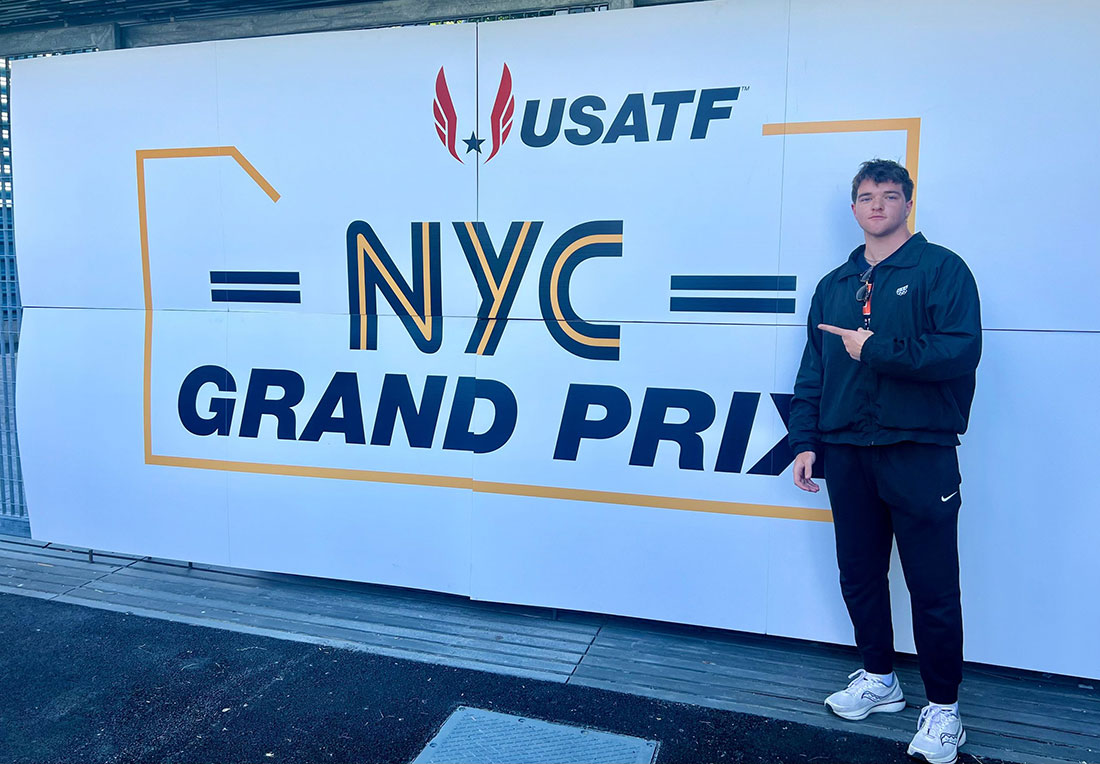
The 2024 Paris Summer Olympics and Paralympics are here and representatives from the Falk College of Sport and Human Dynamics at Syracuse University will have an impact on this year’s Games – and, quite possibly, future Olympic Games.
The Falk College representatives who are involved in several unique ways with the Olympics and Paralympics include current Falk students Dan Griffiths and Livia McQuade, Department of Sport Management Associate Professor Jeeyoon “Jamie” Kim, and Falk graduates and former Syracuse University student-athletes Freddie Crittenden III, Kristen Siermachesky, and Lysianne Proulx. Here are their stories:
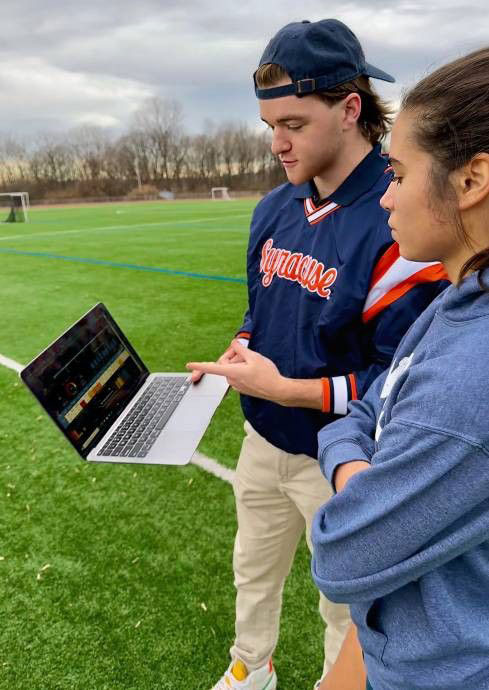
Student: Dan Griffiths
At Syracuse University and now with the U.S. Track and Field team (USATF), sport analytics major Dan Griffiths ’26 is helping to revolutionize how performance data is collected and analyzed.
When Griffiths started working with the Syracuse track and field and cross country teams before the 2023-24 academic year, the teams weren’t utilizing a data-gathering system. But the student-athletes were using Garmin wearables to track their own data, so Griffiths built his own application and a tool that transported all of their data into his application, which then created spreadsheets he used to analyze that data.
With Griffiths’ help, the Syracuse women’s cross country team won its first NCAA Division I Northeast Regional championship since 2011. Throughout the academic year, Griffiths conducted and presented his research at various national competitions and conferences, including the UConn Sports Analytics Symposium (he was runner-up in sport analytics research), and the inaugural Sport, Entertainment and Innovation Conference (SEICon) last week in Las Vegas.
Griffiths’ success at Syracuse and his interest in track and field led to his connection with USATF, which gave him the freedom to explore his areas of interest. Using a combination of the latest technology, Griffiths helped create three-dimensional models to best understand an athlete’s musculoskeletal forces.
“For throwers (discus, shotput, javelin), my work focused on using a pose estimation model to detect patterns that could be linked to longer, more powerful throws,” Griffiths says. “For sprinters and distance runners, I used pose estimation data to monitor overtraining and track progress throughout the season and before meets.
“I also conducted extensive research for multi-event athletes in the heptathlon and decathlon,” he adds. “This research aimed to understand how fatigue affects scoring in multi-events and how different training sequences can reduce fatigue.”
Griffiths shared his work with the coaches, and at least two of the athletes he analyzed will be participating in the Olympics: javelin thrower Curtis Thompson, and 400-meter runner Alexis Holmes. During his time with USATF, Griffiths traveled to the New York City Grand Prix Meet–the final meet for track and field athletes before the U.S. Olympic Trials–and the Olympic Trials in Eugene, Oregon.
“The thing we think about every morning is ‘How can we win another gold medal today?’” Griffiths says. “Having the opportunity to combine everything I’ve learned and truly be a trailblazer and innovator for USATF and those athletes, especially in a track and field biomechanics context, has made me uber-passionate about the work we are doing at Syracuse and the future of AI/analytics and sports.”
The track and field events run from Aug. 1-11.
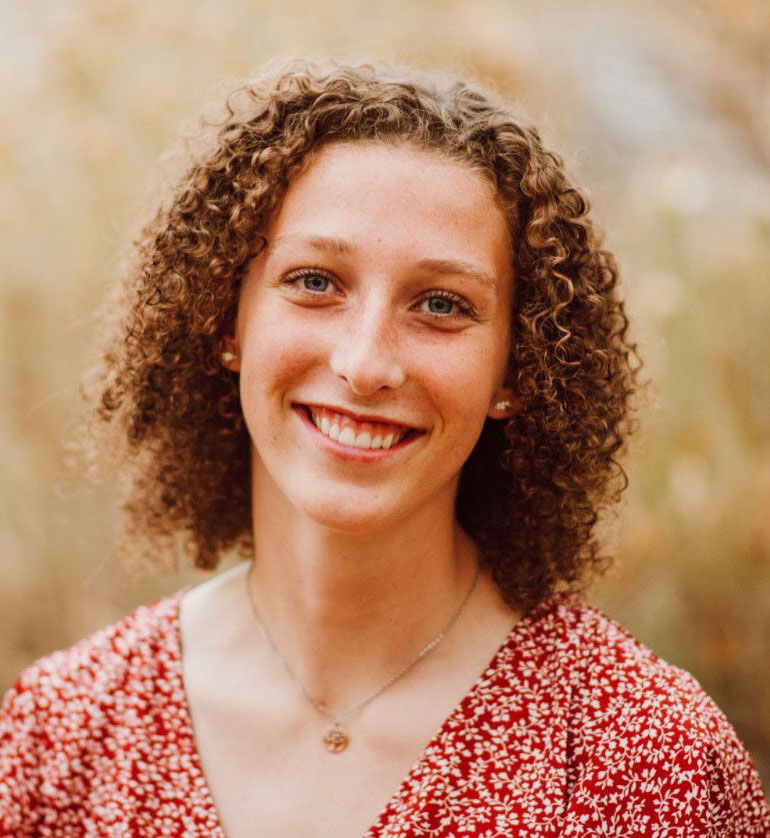
Student: Livia McQuade
Livia McQuade ’25 is a sport management major and sport event management minor who has spent this summer in Loveland, Colorado, as an Athlete Relations Intern with Olympus Sports Group. Olympus is a management and marketing agency that provides top sponsorship opportunities and marketing strategies for Olympic and Paralympic athletes.
In her role, McQuade has interfaced with athletes from the U.S. Olympic and Paralympic teams and their partners, and with the U.S. Olympic and Paralympic Committee and other national governing bodies. Her projects have included reviewing contracts, building athletes’ personal websites, and organizing outlines for athletes’ speaking engagements.
“I’ve had a truly incredible experience within the Olympic and Paralympic Movement – during a Games year of all times!” McQuade says. “Through it all, I’ve had the privilege to work with some of sport’s most impactful Olympians and Paralympians, including Apolo Ohno, Jessica Long, Noah Elliott, Sarah Adam, Alex and Gretchen Walsh, Alex Ferreira, and Steve Serio.”
McQuade, the executive vice president of the Sport Management Club in Falk College and co-chair of the club’s 2024 Charity Sports Auction, says she wants to work with the Olympic and Paralympic Movement following graduation and this internship has been an invaluable step in that process. Her experience with Olympus will continue in September, when she’ll attend the Paris 2024 Paralympic Games to serve as a resource for U.S. athletes, their families, and their sponsors. The Paralympic Games run from Aug. 28-Sept. 8.
“I could not be more grateful and excited,” McQuade says of her upcoming experience in Paris. “My leadership (at Olympus Sports Group)–Ian Beck and Jessica Leonard ’16–have thrown extraordinary opportunities my way, and they will remain valuable mentors long into my career.”
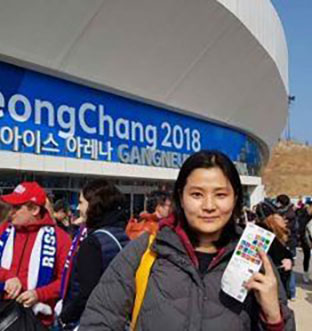
Faculty: Jeeyoon “Jamie” Kim
Jeeyoon “Jamie” Kim is an associate professor in the Department of Sport Management who studies the long- and short-term social and economic effects of hosting the Games and other major sporting events. Kim is the former manager of the Korean Olympic Committee, and on Aug. 8 she’ll present at the 11th International Sport Business Symposium in Paris.
Kim’s presentation will focus on how the Youth Olympic Games, an Olympic-style event for athletes between 15 and 18 years old, can better impact their host city and support the aims of the Olympic Movement.
“The hope for Olympic sport participation legacy is grounded on the ‘trickle-down effect’ (i.e., watching Olympians compete will inspire youth to participate in sport),” Kim says in a Q&A with Syracuse University News. “For the Youth Olympics, the event can also be a steppingstone for younger athletes to compete on the international stage and grow to become Olympians. Additionally, the Youth Olympics offer many grassroots-level sport opportunities (e.g., sport camps, collaboration with local schools) to encourage the general youth to learn about Olympic sports.”
To combat youths’ dwindling interest in the Olympics, the International Olympic Committee added break dancing, sport climbing, and surfing to the lineup for Paris. Kim says this is a critical time for the future of the Olympics as upcoming Games in Paris, Milan Cortina (2026), and Los Angeles (2028) will be held in traditionally strong sports markets where there are opportunities to increase interest.
“Paris 2024 will be the first Olympics to include breaking in the official program,” Kim says. “We will have to see how the event turns out. But, so far, looking at the Olympics qualifiers series and the ticket popularity, it seems like there is a lot of interest garnered for the sport.”
Kim spent 5 ½ years with Korean Olympic Committee as a member of its International Games, International Relations, and 2018 PyeongChang Olympics task force teams. While in Paris, Kim will conduct research in Korea’s Olympic Hospitality House and share her findings with students in her Olympic Sport Management (SPM 356) and Olympic Odyssey (SPM 357) courses.
And Kim plans to attend the women’s individual finals event of her favorite summer Olympic sport, archery. “Korea has been very strong in the sport historically, and it is always fun to watch a sport where my team does well,” Kim says.
For more about Kim’s research and visit to Paris, read this Olympic Legacy story and watch a video of Kim from Syracuse University’s central marketing team.
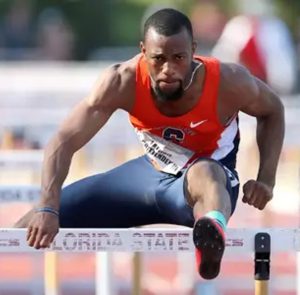
Athletes: Freddie Crittenden III, Kristen Siermachesky, and Lysianne Proulx
At the U.S. Olympic Trials in late June, longtime U.S. hurdler Freddie Crittenden III ’17 qualified for his first Olympic Games by running a personal-best 12.96 seconds in the 110-meter hurdles. Crittenden finished second overall to teammate and three-time world champion Grant Holloway, who recorded a time of 12.86.
A public health major at Falk and a former All-American for the Syracuse track and field team, Crittenden just missed a bronze medal at the World Championships last summer and now at age 29, the Olympic Trials may have been his last opportunity to qualify for the Olympics.
“It feels amazing. Honestly, I’m still in shock and I’m trying to figure out what happened,” Crittenden said immediately after his Olympic Trials run. “But it’s an amazing feeling to come out here and accomplish what I’ve been trying to accomplish for the past 17 years. It’s beautiful.”
Two former Falk College sport management majors and Syracuse University student-athletes, rower Kristen Siermachesky ’21 and soccer goalkeeper Lysianne Proulx ’21, are alternates for the Olympics with Team Canada.
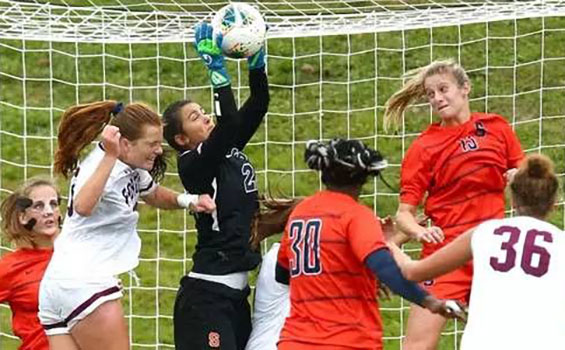
Proulx is Team Canada’s third-choice goalkeeper, meaning she will be activated if either the starting or backup goalkeeper is injured. Although she didn’t start at Syracuse until her junior season, Proulx recorded the fourth-most saves (281), second-most saves per game (5.3), and seventh-most shutouts (eight) in program history.
Since graduating from Syracuse, Proulx has excelled in professional leagues in Portugal, Australia, and now in the United States with Bay FC of the National Women’s Soccer League. This past February, Bay FC acquired Proulx from Melbourne City for what Melbourne City described as a record-breaking transfer fee for an outgoing A-League player.
A native of Montreal, Quebec, Proulx represented Canada in the FIFA U-17 Women’s World Cup and FIFA U-20 Women’s World Cup. She went to the 2023 FIFA Women’s World Cup as Team Canada’s third-choice goaltender behind Kailen Sheridan and Sabrina D’Angelo, who have maintained their positions for the Olympics.
Like Proulx, Siermachesky ’21 will be available to her team if an injury occurs. But unlike Proulx, her path to Canada’s rowing team featured a different sport at Syracuse: ice hockey. She played four years as a defenseman at Syracuse and recorded a black-and-blue inducing 132 blocks in 125 games for the Orange.
After graduating from Syracuse, the native of New Liskeard, Ontario, considered playing ice hockey overseas but decided to pursue her graduate degree in sports administration at North Carolina. She wanted to continue her athletics career, but North Carolina doesn’t have an ice hockey team. Then-Syracuse ice hockey coach Paul Flanagan suggested she try rowing and contacted the Tar Heels’ coach to make that connection.
Siermachesky’s athleticism and potential caught the eye of the Team Canada Development Team, which asked her to move to British Columbia to train with the national team. Just three years into the sport, she is now on the cusp of competing in the Olympics and it’s likely she and Proulx will remain in the mix for the next summer Olympics in Los Angeles in 2028.
The rowing competition runs from July 27-Aug. 3, while the women’s soccer tournament started July 24 and runs through Aug. 10.
Editor’s Note: This story does not include all Falk College representatives in the Olympics. If you know of someone who is involved and not mentioned, please email Matt Michael, Falk College communications manager, at mmicha04@syr.edu.
Gold Medal Alum
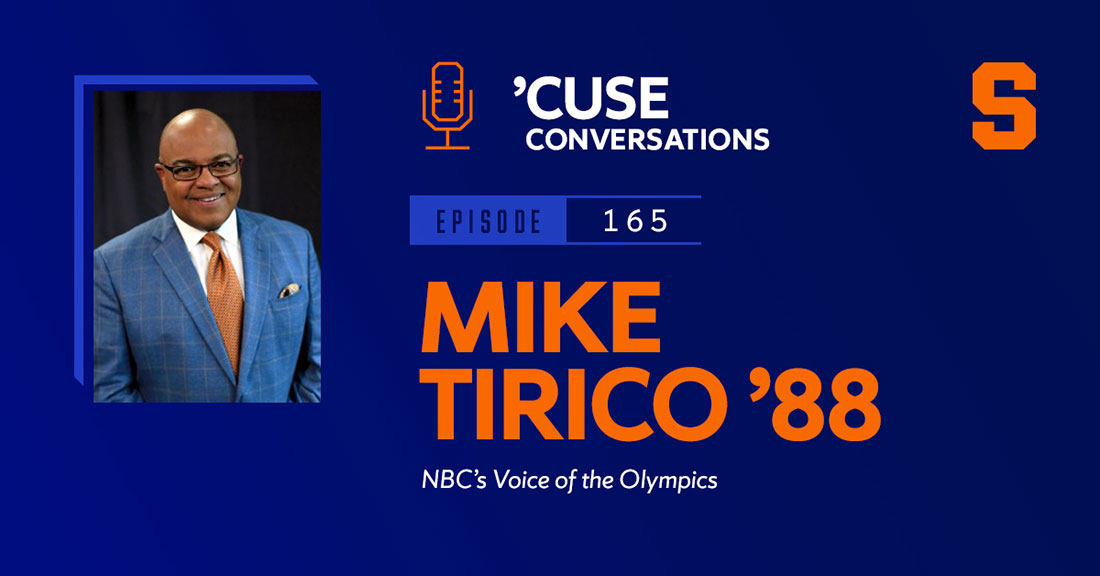
“My mom will tell you, even as a little kid, I was walking around pretending to be a sportscaster,” he says. “This is what I wanted to do in life.”
As the athletes prepare for competition, Tirico is preparing to anchor NBC’s daily Olympics coverage as he’s done since 2016. But as most broadcast fans know, Olympics studio host is only part of the Tirico portfolio, which includes “Sunday Night Football,” PGA golf, and thoroughbred and Indy racing among others. Those sports he knows well. This summer he’ll be put to the test with new Olympic sports, all while trying to avoid making waves.
“Surfing is happening in Tahiti at the Olympics, I put up my hand to volunteer to be the surfing correspondent,” says Tirico, who adds with a smile that “for some reason, they went with Colin Jost from ‘Saturday Night Live.’ I don’t know what I should read into that but it’s fine.”
Break dancing is another sport new to the games and according to Tirico a sign of the athletic times. “It does speak to what the Olympics does in trying to reach out to new generations and keep the youth of the world involved,” he says. “There was a time that snowboarding came in the Olympics and people were asking why. Now, snowboarding is one of the cornerstones of the Winter Olympics.”
In this “’Cuse Conversations” podcast, Tirico talks about getting ready for the games, his sleep schedule while in Paris (it’s rough), his commitment to helping our young broadcast students and, as a first-generation student who met and married his wife here, his love for Syracuse University.
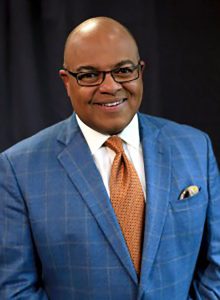
Here are some excerpts from the Podcast…
What are your most memorable moments from the Games?
This would be the fifth Olympic Games I cover, the fourth as the primetime host and watching Americans win gold medals in person, those stick out for me. When we say the Olympics brings the world together, I don’t mean to be too Pollyanna about it because the Olympics are flawed in many ways, they are impacted by politics and corruption and all this stuff that’s happened, those stories have been well reported for years. But just the fact that there’s somebody in South Sudan who is training the same way somebody is training in South San Francisco for the same event and they get to meet in the middle and figure out who’s better, that’s still really freaking cool for me.
With 30 different Olympic sports and more than 10,000 athletes, and knowing your busy sports coverage schedule, how do you find the time to prepare?
If I’ve learned anything, it’s you can’t be prepared for everything at the Olympics. The key is to know how to access it and, oftentimes, that is our research team. The unheralded heroes of Olympic coverage for generations have been and continue to be the research teams who work year-round on the details of the competition.
In the lead up to it, it’s go over all the stuff so you know where it is but don’t memorize it because you can’t. You can’t know everything about each of the 10,000-plus athletes or every sport, all the 200-plus countries or delegations that will come down the river, in this case, the opening ceremony in France.
So, it is learn how to prepare for it and really focus in on the stuff we cover the most—swimming, gymnastics, track and field, basketball, volleyball, beach volleyball, women’s soccer, men’s soccer. Know that and then know the big athletes, the 50 or so that will become somewhat familiar names to households around America.
In many ways you are not starting from scratch here, are you?
You’re not starting from zero, you’re starting from, “Okay, I remember this in Tokyo and let’s just build on that.” And I think, during the years now as well, maybe I wouldn’t have been paying attention to the world swimming championships that were on, but now that I know this is my job and I’m getting ready for this Olympics, which gets you ready for the next one, you pay more attention. The global athletes, international athletes are on my radar way before I open up a book and say, “Okay, today is swimming day, let’s start cramming for swimming.” It helps significantly to have some gray hair in the chair.
Mike, you and I have been friends for many years, having worked together at WTVH in Syracuse. If we could go back, what would you say to young Mike, the sportscaster at TV5?
I wish I could tell younger Mike to have a little broader view and be adventurous more. I think being adventurous as a journalist is impactful and I think, over time, we start to feel that a bit more. I think you know you’ve done the job, you’ve established yourself. It’s so hard to fake confidence but that’s what you have to do at an early age. I’m 21, 22, here I am trying to ask Jim Boeheim a question. Jim Boeheim, at that point, knew a thousand times more about basketball than I did and I’m trying to ask an impactful question and make a difference and I wish I would’ve had a little more ability to fake my confidence and get through that stuff back then. And that, if you’re prepared, you’re going to be all right and you don’t have to doubt yourself.
Listen to the full story…
’Cuse Conversations: NBC’s Voice of the Olympics Mike Tirico ’88: Memorable Olympic Moments and a Love for All Things Orange
Hello and welcome back to the ‘Cuse Conversations Podcast. I’m Keith Kobland, associate director of media relations. And, on this week’s ‘Cuse Conversations, one of Syracuse University’s best known alums prepares for the Olympics.
Mike Tirico:
When we say the Olympics brings the world together, I don’t mean to be too Pollyanna about it because the Olympics are flawed in many ways, they are impacted by politics and corruption and all this stuff that’s happened, those stories have been well reported for years. But just the fact that there’s somebody in South Sudan who is training the same way somebody is training in South San Francisco for the same event and they get to meet in the middle and figure out who’s better, that’s still really freaking cool for me.
Keith Kobland:
Our guest today on the ‘Cuse Conversations podcast really needs no introduction but I must. It’s Mike Tirico from our class of 1988 and probably one of the best known in the field of sports broadcasting. Full disclosure, Mike is also a friend who I worked with in local TV many years ago, he’s currently preparing for the Olympic Games in Paris hosting coverage as he’s done since 2016. During our conversation, we talked about his work with Olympic coverage, his most memorable moments, his sleep schedule and, of course, his love for his alma mater. But first, his upcoming assignment and, of course, I had to ask him about what to expect including the new and unique this summer.
Let’s start it off. New sports at the Olympics are always the big story, Mike. What’s your favorite break- dance team? How do you see things handicapped for this Olympics?
Mike Tirico:
Yeah, thankfully, there’s an age limit or, if there’s not, I’m putting one in. That’s not happening for me, right? Man, Keith, it’s a strange deal. We’re of the similar generation that you grew up and break-dancing with something you’d see in New York on a street corner or people would try it in different places and then you’d watch it proliferate to some kind of entertainment form but I never thought it was something you’d see in the Olympics. But it does speak, in a small way, to what the Olympics does, it’s keep trying to reach out to new generations and keep the youth of the world involved. There was a time, Keith, that snowboarding came in the Olympics and people were saying, “What are you talking about?” Now, snowboarding is one of the cornerstones of the Winter Olympics.
So, the Olympics have done this for generations, tried to grow with where people are being active. And I said I’m a stick and ball guy, I like it so the score is four to three or three to two, this seems hard to judge. Well, gymnastics is hard to judge to the naked, untrained eye and so too is figure skating, they all look beautiful, I can’t tell the microscopic difference, the judges can. This is the same thing. So, because of all those complexities, I’ll not be break dancing.
Keith Kobland:
I was going to say, I can’t use the term bust a move in this case, can I?
Mike Tirico:
No. No, no, no, no, no.
Keith Kobland:
[inaudible 00:03:02]
Mike Tirico:
No. Correct.
Keith Kobland:
So, you’ve been doing Olympic coverage. Obviously, the variety of sports but Olympic specifically since 2016, I believe, if I’m not mistaken.
Mike Tirico:
Right.
Keith Kobland:
Is there a memorable moment? Can you pick one out? Is it possible?
Mike Tirico:
Yeah, there are some that are competition driven. This would be the fifth Olympic Games I cover, the fourth as the primetime host and watching Americans win gold medals in person, for some of the times, we took the studio on the road to host the show, those stick out for me. And I don’t mean to be negative about it, one’s a positive, one’s a negative but it’s a little bit of the geopolitical when it comes to the Olympics. One of the negatives was being at the opening ceremony in Beijing in the winter of 2022 and about 25 yards this direction from where I was hosting the opening ceremony was Xi and Putin and they had just done their meeting about this unbreakable bond and all of this and, really, you started to see some of the seeds of pre-Ukraine happening right there. That’ll be one of those moments I go, “Wow, that was history.”
And then watching the Chinese delegation come in at home and then you see members of the Uyghurs come in, who were part of the human rights conversation with China, they march in the opening ceremony as a, “Hello, we hear what you’re saying, world, about our human rights and we’re just going to put it right in the middle of the opening ceremony, pretend like it’s all good.” That was impactful, life- changing for me.
The other one was watching, in Pyeongchang, South Korea, watching North Korea and South Korea walk in as a unified team. Watching people in the same uniforms, in the same group walking in who, if they were seen connecting, conversing together in the name of sport at any other time, not under the flags of the Olympic rings, there would be problems. A North Korean walking in South Korea and vice versa, you’re taken away and detained. Here, they were embraced together as one Korea. Sadly, in the six years since, nothing’s happened to further that but the Olympics brought it together.
And for me, my other side of the street from Newhouse at Syracuse is Maxwell, I’m a political science major, those were historic world global events and to be right in the building with that happening is stuff I’ll never forget, maybe lasting a bit longer than Nathan Chen winning gold in ice skating or different figure skating or different things that we’ve seen along the way.
Keith Kobland:
I will get to your news acumen in just a moment because I think that does play a role here in all of this, the fact that this has been a passion of yours through the years. But for the Olympics though, Mike, 10,000 athletes, 30 different sports, how do you … I think I’ve seen the binder for your research, how do you find the time? Obviously, the research is important.
Mike Tirico:
Well, I’m now hip and young so I keep them as PDF files and I annotate on my iPad. So, I am next gen, I am saving the world one binder at a time, we’re not printing out all these tree-killing binders for me. No, Keith, if I’ve learned anything, it’s you can’t be prepared for everything at the Olympics. The key is to know how to access it and, oftentimes, that is our research team. The unheralded heroes of Olympic coverage for generations have been and continue to be the research teams who work year-round on the details of what are the rules for breaking, breaking competition.
Surfing is happening in Tahiti at the Olympics, I put up my hand to volunteer to be the surfing correspondent, for some reason, they went with Colin Jost from Saturday Night Live. I don’t know what I should read into that but it’s fine. I don’t know the surfing details of, “Well, wait, what does that mean in terms of the big competition?” but our research team has done that work. So, for me, in the lead up to it, it’s go over all the stuff so you know where it is but don’t memorize it because you can’t. You can’t know anything about each of the 10,000 plus athletes or every sport, all the 200 plus countries or delegations that will come down the river, in this case, the opening ceremony in France.
So, it is learn how to prepare for it and really focus in on the stuff we cover the most, that’s swimming, gymnastics, track and field, basketball, volleyball, beach volleyball, women’s soccer, the men’s team made it for the US. Know that and then know the big athletes, the 50 or so that will become somewhat familiar names to households around America and the global ones too like Leon Marchand who’s a swimmer from France who goes to Arizona State who could be the home nation star of the games or, Summer McIntosh, a teenager from Canada who’s a swimmer who was motivated to become a great swimmer because of Katie Ledecky’s success and now could very well beat Katie Ledecky in a freestyle race in these Olympics.
So, that’s where you try to learn the stories that you know are going to matter and, when the ones come up that are the wows that make sports exciting, you know how to scramble and get there.
Keith Kobland:
Exactly. And having that background that you have too, I’m sure you dip into that background knowledge, it’s not as if … You’re gaining new knowledge, obviously, but having done this for a while, you have the experience.
Mike Tirico:
Great point and it’s a big help, you know where … You’re not starting from zero, you’re starting from, “Okay, I remember this in Tokyo and let’s just build on that.” And I think, Keith, during the years now as well, maybe I wouldn’t have been paying attention to the world swimming championships that were on, but now that I know this is my job and I’m getting ready for this Olympics which gets you ready for the next one, you pay more attention. So, the Marchands or the McIntoshes who I just mentioned, global athletes, international athletes are on my radar way before I open up a book and say, “Okay, today is swimming day, let’s start cramming for swimming.” It helps significantly to have some gray hair in the chair, I would say.
Keith Kobland:
Not a lot, just a little.
Mike Tirico:
None, but that’s okay.
Keith Kobland:
You still look wonderful, come on. Now, what is it … You mentioned a day, I think I just saw, am I mistaken, where you and Snoop Dogg are going to be something primetime too, primetime Paris which is, what, 2:00 AM their time?
Mike Tirico:
Yeah, I’ll be hanging with Snoop at 2:00 AM in Paris, what could go wrong, right?
Keith Kobland:
[inaudible 00:09:40] other.
Mike Tirico:
Yeah, good luck. Good luck. Yeah, there’s a whole … No. So, it was interesting. We tried to figure out how do you boost the Olympics? Look, our world is very complicated in terms of entertainment options, there are a lot of them out there. So, we see, when we show up every four years with the Olympics, you don’t have the same carryover you used to in the three-channel world of the ’50s, ’60s, ’70s and ’80s when we became familiar in household names with Olympic stars and they were on boxes of Wheaties and all that stuff. Now, the marketing, really, sports marketing has a lot of roots in the Olympics. Sports marketing happens everywhere at every level, high school players, all the collegiate players, pro players’ proliferation, growth of women’s leagues, popularity of all these sports so you don’t have a place for those Olympians to stay on the radar.
So, I think a lot of people have lost touch with what makes the Olympics unique, special and captivating. So, we’re trying to reach out to different demographics, Snoop is a great connector of that, he’s brilliant, he’s a terrific communicator, he’s super talented, well-known, connects with athletes, athletes’ families so we’re going to put him to … Is known globally so we’re going to put him to use. He’s going to be a little bit of our tour guide for Paris, he’s going to spend time with some athletes, he’s going to get to do some fun things with Olympians who you know and love that’ll give you a little bit of reason to laugh. So, the reason it has a place, Keith, without getting too in the weeds here for our Olympic coverage, we’re going to be live across America during the day.
So, 8:00 to 11:00 Paris time is 2:00 to 5:00 East Coast time, we’re going to be live on NBC on the broadcast network showing the biggest events of the day live in the middle of the afternoon. So, we’re going to come back and reprise those at night and we’re not just going to put the VCR tape in and go, “Okay, here’s the VHS, let’s hit play and here’s what we did three hours ago,” we’re going to dress it up a little bit. And in addition to having behind the scenes with athletes and their parents, deeper analysis of stuff, we give you a little sprinkling of things around Paris because it’s such a great city. So, that’s where a Snoop will come into play and other celebrities who are going to be a part of our coverage.
We won’t take away from delivering the meat and potatoes of competition and the athletes but, when we come back and show it at night, it’s going to feel like a primetime show a little bit more. So, that’s why you start adding people who may help widen the net of the folks who are consuming the Olympics.
Keith Kobland:
Oh, are you kidding me? Tirico and Snoop Dogg, I love it.
Mike Tirico:
We hanging, man. He’s called me Mikey, he’s called me … He said, “Mikey, I’m the Robin to you. I’m your Robin, you’re Batman.” I’m like, “Okay, in what universe did this happen?” but it’s cool. So, I’ve got it on tape forever and I’m going to live with it.
Keith Kobland:
These are the … I love this, by the way. I would be excited and get too far off. These are long days though, Mike, it seems like these are going to be long-
Mike Tirico:
Yeah.
Keith Kobland:
It’s not that you’re not used to it but these are up early, work until 2:00 AM in some cases.
Mike Tirico:
Yeah. It should be the end of our show is 5:00 AM US time, East Coast time so you’d be working a graveyard shift for two and a half weeks. Look, I’m talking to a guy who I know did a lot of morning radio and morning TV in your life and you know that … Bryant Gumbel had the best line, Keith, the legendary Today show host. And to clean it up as much as possible, he said, “Hey, it really stinks,” used a different word, “For the first 15 minutes you wake up no matter what time it is. So, you just have to get used to it and then you move on,” and that’s exactly the way I’m looking at it. It’ll be fine, get good five, six hours of sleep at night. You don’t sleep much in the Olympics and then you just get back up and rinse, repeat for 17 straight days.
Keith Kobland:
That’s it. Once you’re awake, you’re awake.
Mike Tirico:
You’re up, let’s go.
Keith Kobland:
That’s it. Look, okay, we’ve covered break dancing, I think you’ve mentioned some of the other big storylines. Is there anything that we should be, as we wrap up the Olympic part of this, anything else that we should be keeping an eye out for?
Mike Tirico:
Keith, I’m excited to see in general is how many athletes come back from 2021 and succeed in 2024. Remember, Tokyo, last summer games, 2020, delayed by COVID, pushed a year. I think a lot of athletes looked ahead at that next Olympic quad as we call it, the four years between games, and said, “Well, it’s three, maybe I’ll hang around.” So, I think we may see a lot of Olympians with experience come back and contend for medals and that Olympic experience is so important, I think that’ll be a big storyline. I think the USA-Australia swimming rivalry will be a big storyline right out of the gate in the first full day of competition on Saturday. I think Simone Biles’s return, greatest of all time disappointment in Tokyo as she openly dealt with mental health issues that impacted her ability to perform at the elite level she established for many years, she can come back and perform at a high level, she’s been sensational in the run up to it.
So, all those things, I think, are those headlines and the last one I’ll say is US Track and Field could be an exceptionally strong team and there is a chance that America could have the fastest man and woman winners of the hundred meters in both disciplines and that hasn’t happened since the ’80s. So, some great storylines out there that I think will play out over the games. And of course, there’s all the typical political story, Russia not there, China accused of doping in the swimming space last time around. Obviously, what’s happening in the world with sensitivity to, not just Ukraine and Russia, but the Middle East as well, France and England both in the middle of elections right there in the seat, the hot seat that is European politics.
So, there’s always that buzzing around. The Olympics will never be apolitical, they’ll always have some element of that. So, I think all those things together are all sitting out there and one of them will rise to the top of the burner.
Keith Kobland:
And sometimes it’s the beauty of putting the politics aside to just focus on the athletic competition too at the end of the day.
Mike Tirico:
You’re so right, Keith. You think about it, you’re over 200, usually 205 or six delegations or territories that walk in or, in this case, float into the opening ceremony, that’s the largest gathering in the world, that’s a larger gathering of countries and territories than you get at the United Nations General Assembly. So, when we say the Olympics brings the world together, I don’t mean to be too Pollyanna about it because the Olympics are flawed in many ways, they are impacted by politics and corruption and all this stuff that’s happened, those stories have been well reported for years. But just the fact that there’s somebody in South Sudan who is training the same way somebody is training in South San Francisco for the same event and they get to meet in the middle and figure out who’s better, that’s still really freaking cool for me.
Keith Kobland:
Yeah. And as we end the Olympic part of this too, just the visual, as you mentioned, the opening ceremonies where you have countries marching in and, in some cases, it might be one or two athletes and you really … That’s sometimes what brings it home that it’s one or two people representing an entire nation.
Mike Tirico:
If you are a fan of bingo and you want to set up a bingo card for the opening ceremony, I guarantee you, at some point, I will mention, as one of those countries is introduced, their Olympic moment is right there. Their Olympic moment is being a part of the 10,000 athletes, of getting the chance to be one and the same with LeBron James and Simone Biles and the great athletes of the world, they are an Olympian. And if we went to Angola or if we went to Auckland, New Zealand and I said, “I’m an Olympian,” which I’m not, but people would get that. Now, if you say, “Hey, I’m the first team all-American quarterback from Syracuse,” people are like, “What do you mean?”
You say I’m an Olympian, everybody around the world knows what that means. So, what you see when those athletes come in is their Olympic moment and that’s an achievement of a lifetime for many of them and it’s really cool that we get the chance to chronicle their stories, share their stories and watch them compete.
Keith Kobland:
I want to switch gears slightly-
Mike Tirico:
Sure.
Keith Kobland:
… this is a Syracuse University podcast.
Mike Tirico:
Yes.
Keith Kobland:
You, obviously, Mike, class ’88, big part of the Orange Family Board of Trustee, you mentioned taking classes too, very involved in Newhouse, and I want to touch on that in a moment, but why is it important for you to give back? You are someone who is really so generous with your time and I’ve seen this in many examples. Why do you do it?
Mike Tirico:
I love our school, period. Exclamation point, let me change the punctuation there. I love our school. Man, Syracuse, I was a first-gen in my family before we were using that term first-gen college student and I just look back now and I learned so much professionally, personally. My best friends, my Syracuse friends got married to a Syracuse alum, we met on campus, got married in Hendricks Chapel, spent time there afterwards working with you and the rest of our friends at WTVH who are still some of my dearest friends. Not a week or two goes by that I don’t share a text or connect with Kathy or Tracy Davidson or John Eves, my old sports partner at channel five, stayed in touch with a ton of folks, you when I come up to campus as well.
So, there’s that and then there’s the appreciation I gained during my time at school for the people who came back to share what Syracuse meant to them to help us whether they were off air or on air. I remember going to Newhouse at 2:00 when it was still a relatively new building and Bob Costas or Marv Albert or Dick Stockton or Len Berman or other producers behind the scenes would come in and share their knowledge and I always thought, one day, I’d like to be a person who comes back and does that. And that’s where my connection of giving back to the university really started and it just continued to manifest and grow and I actually have just as much passion and interest for what happens across campus as I do what happens with athletics or at Newhouse.
I love the things that the school has done at a very high level for the student experience, for the way the university has been thought leaders, especially under Chancellor Syverud’s tenure and leadership, and I’m just really proud of our school. Are we perfect? No, nothing in life is perfect but the team that tries to get it done on a regular basis is awesome and that’s … My fellow trustees who I get to serve with, the administration, the faculty, we’ve got the parents, the students … And Keith, that’s the one thing that always fuels me. You come there and speak to students, man, you feel like our future’s good. Every once in a while, you sit there and go, “Our country’s doomed,” until you sit around college students and you’re like, “Damn, we’re going to be … If we can just get you guys in charge now, we’ll be all right.” So, it’s a long, long way of saying I just love the fuel and energy that Syracuse provided me to get started, the support all the way through my professional endeavors and still today, it’s the proudest thing that I can say about my education, my profession, that I’m Newhouse alum, I’m Syracuse alum and that Newhouse mafia, quote, unquote, we all find each other on the road and have great pride in that as well.
Keith Kobland:
And that’s what I’ve seen in action, Mike, the fact that you do … For a person who is as well-known and busy, again, never is the answer no when it comes to a student that wants to talk with you or that you make time for, I’ve seen this. Again, I know this is not so much a question as a statement but I can see how it is such an important part of your life and the students can appreciate that too. But you’re someone who is very valuable with your time, not a person who seems to have a lot of it but, still, you give of it so freely.
Mike Tirico:
I wish I had more time for more students. And maybe, as I get older, older and retired someday down the line, I’ll follow in your footsteps and do some more of that. I love the curiosity of students. I find students will ask you better questions than journalists sometimes, there’s an unfiltered boldness and carefree approach to life that is refreshing when you’re 18, 19 or 20. And I have a couple of kids who just finished their college education and so to see people who look a lot like the kids who grew up under your roof just recently and watch them in these settings is fun. I love being on campus, love being in the classroom and that’s something, as I come up to campus at least once a quarter or semester, I get disappointed in some ways that I spend so much time with our business as trustees in our meetings, which are hugely important to the future of the university, but I’d like to grab an hour or two more to be in the class just listening and be a resource.
I think, any of us who are alums, can we be a resource to the people who are following us? At the end of the day, it makes our degree more valuable. I think we all have an intense pride in Syracuse, we all have a Syracuse story. So many of us overcame something and found that community connecting us on that campus and that really is the foundation for who we are and what we do and I just love being able to share that passion and, hopefully, vision with the people who are in the formative years now on campus.
Keith Kobland:
Definitely. Is there a top tip that you ever have for them? Is there that one key message that you might have for the students?
Mike Tirico:
Yeah, preparation, preparation, preparation. We were talking about the Olympics before but it’s everything. I’m one of those who doesn’t feel really comfortable unless I’m prepared to do something and I just feel like that preparation helps, not only in your ease with getting in front of a camera or a microphone or behind a newspaper or behind a camera, I just feel that that preparation allows you to perform at your best and be yourself on the air. And that comfort, it’s you know when you cram for a test and you’re not ready or you know when you’re ready for a test, there’s a different feeling in your stomach. One’s a pit of fear in your stomach, the other one’s an adrenaline rush like, “I can’t wait to get this and crush this,” and I think preparation helps you to the latter more than the former. So, I love personally sharing with students, hey, even people who are out and now doing this, be prepared. If you don’t know the rules, learn them, figure them out, be as prepared as you can because that’s one way you can free yourself up to execute as best as you can.
Keith Kobland:
Wow. As we wrap up this ‘Cuse conversation with Mike Turico, I’ve got two more questions for you here, Mike.
Mike Tirico:
Yeah, okay.
Keith Kobland:
First, unlike another colleague of ours at WTDH, David Muir, I don’t think you had a TV news set set up in your basement. I could be mistaken.
Mike Tirico:
No, I did not.
Keith Kobland:
But you did know at an early age this was something you wanted to do, how did you know? How did young Mike Tirico know this is what he wanted to do?
Mike Tirico:
I wish I knew the answer to why but my mom will tell you, even as a little kid, I was walking around pretending to be a sportscaster and this is what I wanted to do in life. Maybe it was because I realized that, an early age, I was not going to be the athlete that I hoped to be and the next natural connection to sports was going to be a team trainer or doctor and I didn’t have the science background or love of science to have that acumen so maybe this was the next best thing. And even on campus, I started working, my first assignment for The Daily Orange as a freshman was the field hockey beat and I learned field hockey and I found that, while very enjoyable and around some great women who were very helpful in learning the sport, I enjoyed the challenge of talk about it as it’s happening as opposed to watch it, do the interviews and go back and write the story. I was very much pulled to the live microphone, the radio, eventually, television part of the job.
So, I was able to find all those challenges and, Keith, it makes a difference because, we’re 50 some odd years removed from me indicating to my mom I want to be a sportscaster someday, and I’m still doing the job and it still wakes me up every day excited for the next assignment or the next challenge or the next day on the air. It doesn’t get stale, it doesn’t get boring. Does the travel factor? Yes. Does it get a bit overwhelming at times the volume of stuff? Yeah, sure. But the joy doesn’t change and I still have as much joy for the job now as I did when I was sharing a newsroom with you back in Syracuse.
Keith Kobland:
And that brings me to my final question and thank you for that segue. It’s been a while, Mike, you and I worked together, the CBS affiliate in town, it was a number of years ago. I guess, if there was one thing that the Mike back then … And by the way, I should mention, Mike Tirico who had come into the newsroom and read news, copy the news card, the A-block stuff and critique it and correct it, that should be noted. Mike, you were always a student of news first.
Mike Tirico:
Oh, god.
Keith Kobland:
What would that Mike Tirico from back in the late ’80s, early ’90s have told Mike Tirico now? If you had that chance, what would young Mike tell an established Mike?
Mike Tirico:
Yeah, I was a news nerd back then, I still am now. I’ll have news on more often than I’ll have sports on in my office at home, I just love the energy that a newsroom provides when there’s breaking news going on and was lucky enough to watch people like yourself produce, get on air, become a great anchor, a great reporter and watch so many of our friends do that along the way. What a team we had. Sidebar, we did the big anniversary for channel five station that no longer has its own independent newsroom or individual newsroom, shares it with channel three, but, man, we had 75 years of memories and talent and just great stories and a whole bunch of people showed up and it felt like it was a family reunion which says everything you need to know about that place, it was a hell of a place, hell of a place.
To answer your question, I wish I could tell younger Mike to have a little broader view and be adventurous more. I think being adventurous as a journalist is impactful and I think, over time, we start to feel that a bit more. I think you know you’ve done the job, you’ve established yourself. It’s so hard to fake confidence but that’s what you have to do at an early age. I’m 21, 22, here I am trying to ask Jim Boeheim a question. Jim Boeheim, at that point, knew a thousand times more about basketball than I did and I’m trying to ask an impactful question and make a difference and I wish I would’ve had a little more ability to fake my confidence and get through that stuff back then. And that, if you’re prepared, you’re going to be all right and you don’t have to doubt yourself and I think self-confidence is a very fine line because I think you can lose sight of it and get too lost in what you’re doing because we are all, all replaceable.
Chris Berman was one of the best people ever to do SportsCenter, Dan Patrick and Keith Olberman were exceptional on SportsCenter over their time. God rest his soul, Stuart Scott’s phenomenal, all of that. Scott Van Pelt on SportsCenter is just as good as all those guys were and just as impactful in a different generation, we are all replaceable. So, while you have your time in that seat, I wish I told my younger self to just be more aggressive, be more bold and be more confident, do it in a way that’s not cocky or conceited. So, I think that would be the advice I would pass and maybe enjoy the ride a little bit more. I think our heads are always down trying to get to the next job and the next accomplishment and the next milestone and maybe don’t take enough time to take it all in and enjoy it.
I’m doing more of that now than I used to, I get to a city and I’ll make sure that I walk around the city and just know the downtown a little bit as opposed to let me stay in for five more minutes and figure out what the 13th player on this NBA roster last did for a good game or when his last good game was. Sometimes there’s a balance and I think we learn that over time.
Keith Kobland:
Yeah. Mike, I have nothing else to ask and your time is so valuable. We really appreciate hearing from you and, certainly, we will be watching this summer as you are hard at work covering the Olympics for us.
Mike Tirico:
With a bunch of Orange folks, we’ve got a great Syracuse alumni group that’s part of our NBC team as well, about half dozen of us so we’re in front of the camera, let alone people behind the camera. And as usual, there’s always a great group of young people who are making their first steps in their career who are coming through the Olympic family as well. So, we’re super proud that, no matter where the Olympic Rings show up, the Orange [inaudible 00:30:56] isn’t too far away so we’ll be repping Syracuse in our own ways. And thanks to you, one, for doing this because these are great, I love listening to this over the year and hear the different connections with Syracuse and all the Syracuse folks and thanks for being such a good friend. People like you make the Syracuse experience truly what it’s all about so thanks, Keith.
Keith Kobland:
And Mike, thanks to you and keep up the great work. That’ll do it for our conversation with Syracuse University’s Mike Tirico. I’m Keith Kobland with a special thanks to show host John Boccacino for letting me sit in this week to talk to an old friend. John will be back with our next episode of ‘Cuse Conversations.
Adapted from a Syracuse University News story by Keith Kobland originally published on July 16, 2024.
Equity in Esports
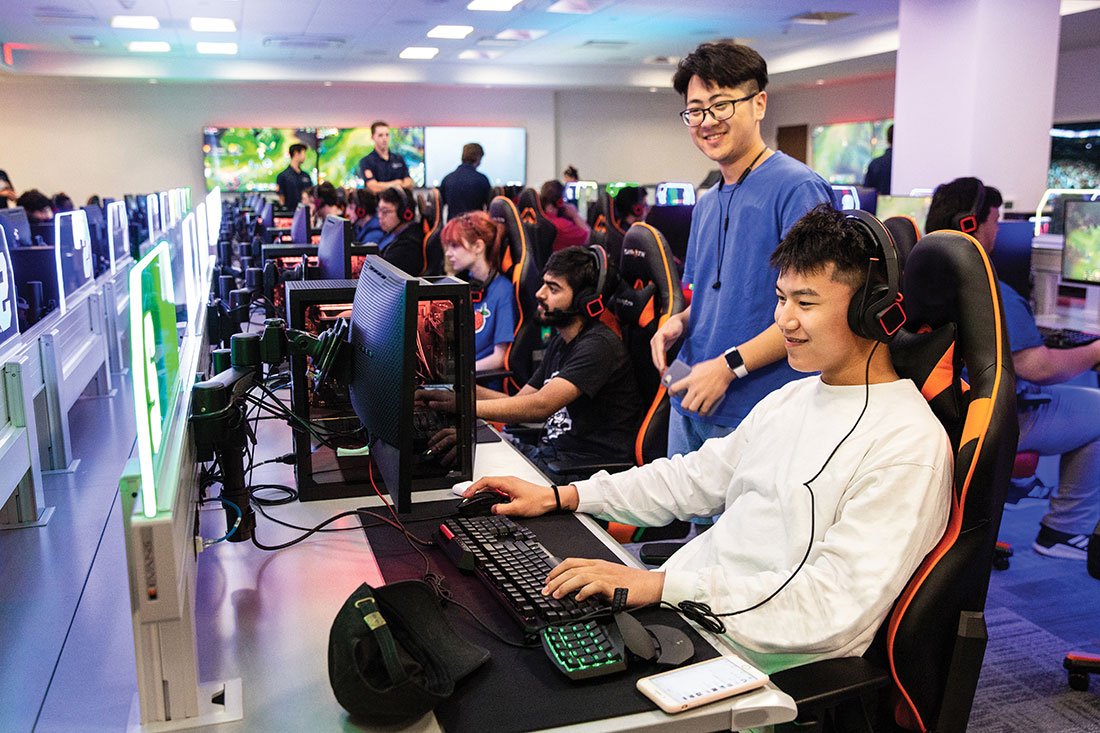
So Darvin, Ph.D., an assistant professor in the Department of Sport Management at Syracuse University’s Falk College of Sport and Human Dynamics, has dedicated her research and teaching career to creating greater equity in esports and gaming.
Darvin has emerged as a national leader in this area, and she was recently named a finalist for the National Association of Collegiate Esports (NACE) Scholar of the Year Award. The winner will be announced at the NACE National Convention July 17-19 in Winter Park, Florida.
“It’s such an honor to be nominated for this award,” Darvin says. “I was thrilled to learn I was a finalist and excited to know that the work I have been doing to drive greater equity in the gaming and esports’ spaces has been recognized by scholars and practitioners across the industry.”
Nationally, Darvin is making an impact as associate editor of the Journal of Electronic Gaming and Esports (JEGE); co-chair of the esports mini-track at the January 2025 Hawaii International Conference on System Sciences Conference, where her goal is advance esports scholarship and promote JEGE and publishing opportunities in the space; and a regular contributor to Forbes Magazine, where she writes columns such as this one about how an all-women’s Fortnite tournament is driving equity in esports.
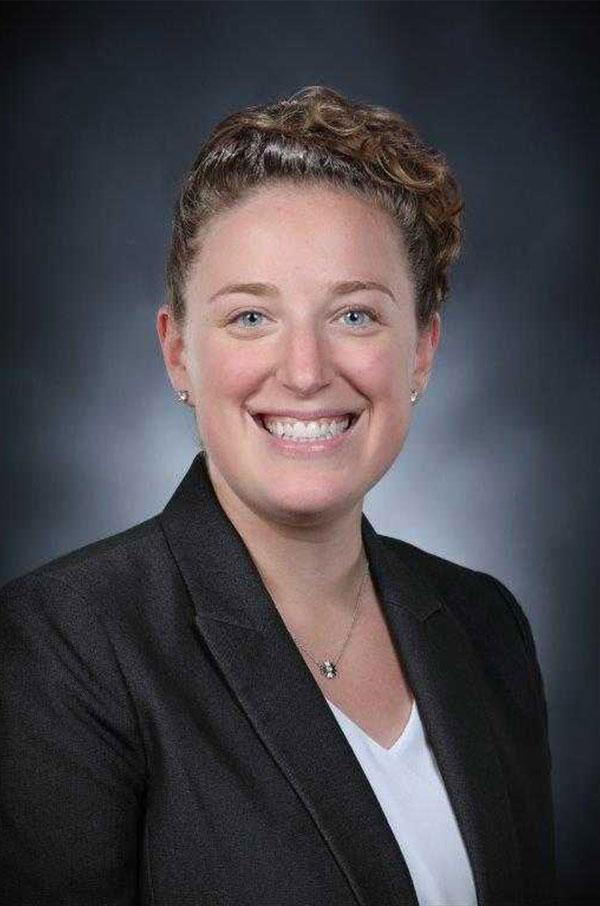
On the Syracuse campus, Darvin has been awarded Falk College seed grants to examine the culture of gaming for gender minoritized participants, and to study the processes of building community in gaming spaces for minoritized participants.
She also received a Syracuse University SOURCE award to work with two undergraduate students on a multi-level review of the underrepresentation of women and girls in esports and gaming (the manuscript is currently being developed). Overall, Darvin has received more than $22,000 in grants and awards for esports and gaming research projects.
Starting this fall, Syracuse University is introducing an esports communications and management program that is being offered jointly by Falk College and the Newhouse School of Public Communications. The course that Darvin teaches, “Race, Gender, and Diversity in Sport Organizations,” will be a required course in this new major.
We reached out to Darvin to learn more about her motivation to create greater equity in the esports and gaming space. Here’s that conversation:
Were you – and are you still – a gamer, and what motivated you to find ways to build equity and community in esports and gaming?
I have been involved in traditional sport spaces from a very young age and for me gaming was always a bit of an escape from those experiences. I was largely a PC gamer when I was young and played a pretty wide range of computer games growing up. Then I moved over to a variety of mostly sport-based games on my Gameboy, and now I’m much more of a console gamer.
I really brought over a lot of my traditional sport experiences as an athlete into my curiosity regarding the levels of equity in esports and gaming. Having recognized initially the influence that traditional sport and gaming had on me in terms of building confidence and risk-taking, I want to ensure all girls and women have the opportunity to experience not only playing for enjoyment, but also the benefits that come from participation in gaming spaces.
Regarding greater equity in esports, can you discuss the progress so far and what you’d like to see happen next?
Girls and women game at pretty high proportions compared to boys and men. Anywhere from 30 to 60 percent of women and girls game, depending on the mode (mobile, PC, console). Game titles are slowly dropping off with the more harmful stereotypes and women are being more prominently featured–think FIFA and NBA2K, for example, with women being featured as avatars and on the marketing materials.
But overall, we are not seeing women and girls at the highest levels of gaming as participants, which means they aren’t seeing the same opportunities to monetize their abilities or build a career through gaming. Right now, only about 8 to 10 percent of collegiate varsity gamers in the U.S. are women, and only about 5 percent of professional gamers worldwide identify as girls or women.
This is what I would like to change in the future by using my research to highlight the cultural issues and organizational processes that sustain this underrepresentation. At the same time, I want to promote the importance of bringing more women and girls to the table–it’s good business.
Can you explain the value of your research in practical terms. That is, how have the results of your research played out in reducing the “isms” (racism, sexism, etc.) in esports and gaming?
To this point, my work across the esports and gaming spaces has focused on three key pillars: 1) Expose (the isms, barriers, and obstacles that limit the advancement of women and girls in the esports and gamine spaces); 2) Debunk (the myths that limit women and girls from climbing to the collegiate and professional ranks, such as stereotypes); and 3) Advance (new solutions, programming, and protocols, including my current work looking to apply Title IX policy standards to ensure equitable opportunities at the high school and collegiate levels of play).
The funding I have been awarded over the previous few years has significantly assisted in accomplishing this overall research agenda, including a 2023-24 Falk seed grant that allowed me to travel for in-person data collection activities and serve as an exhibitor at TwitchCon (a gaming convention). In-person data collection at these conventions is a key component to the work that I do in these areas given how difficult it is to remotely identify highly engaged gamers, and grant funding has greatly assisted in my ability to reach this population.
We’re very excited to welcome the new esports communications and management major to Falk College and Syracuse University. You played a key role in developing and planning the program. Can you discuss how your research and advocacy for equity in esports and gaming will intersect with the goals of the program?
It’s a very exciting time in our department with the esports program officially launching this fall (2024). Throughout some of the earlier stages of planning I was sure to highlight the role of this program in driving greater equity across the esports and gaming spaces. It’s so important that coursework and research works to shape a more inclusive industry for the students we are training to be out in this field.
We want to prepare students for a career that maintains inclusive organizational cultures. Our students are the leaders of tomorrow, and through exposing them to these equity issues across the industry during their time as undergraduates, we are preparing them to create change as they move up the ladder.
The research I conduct also maintains this same mission of working to expose cultures in gaming and esports organizations that may not maintain environments that are welcoming for all employees and participants. We want this new esports program to be a leader in this area and prepare students to create meaningful change in the work they do once they graduate.
Visit the Sport Management homepage to learn more about academic programs, experiential learning, and career opportunities in the sport industry. To learn more about the esports degree program at Syracuse University, listen to this podcast with esports Executive Director Joey Gawrysiak.
Gamechangers
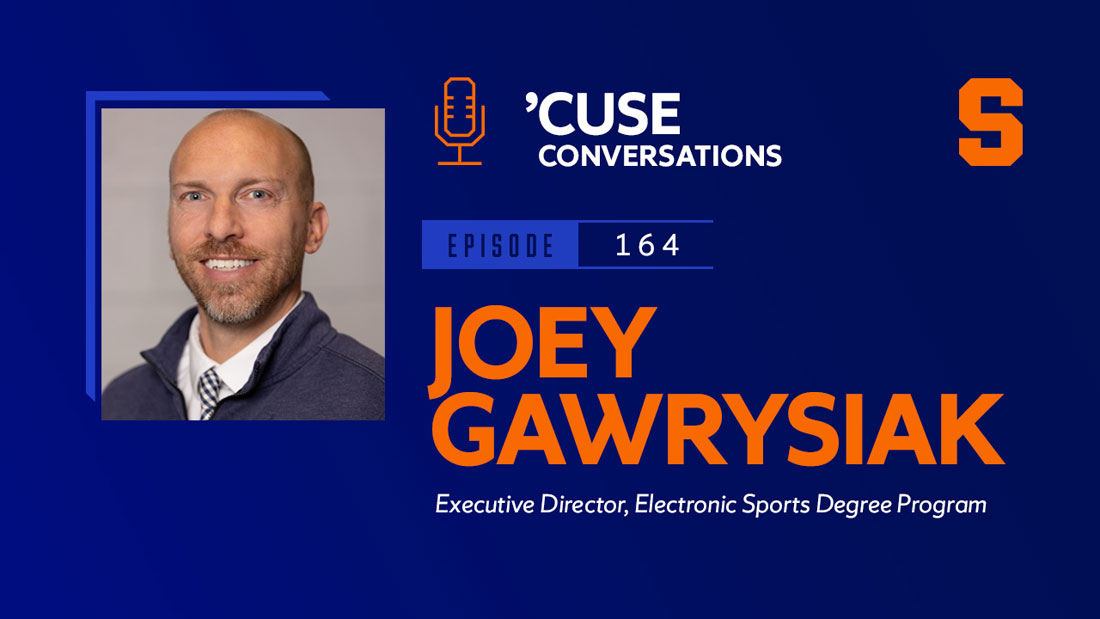
Beginning in the fall, Syracuse University’s electronic sports, or esports, academic degree program will welcome admitted students to campus for classes.
This past academic year served as “Year Zero” for the esports degree program, which employs a holistic, experiential learning-based approach that will prepare students for career success in various industries, leveraging the largest collection of faculty and staff members of any esports program on a college campus.
It’s an all-encompassing venture, including both the academic degree program and the competitive teams that vie for national championships in their respective games.
Academically, students who embark on this first-of-its-kind esports communications and management program, offered jointly by the S.I. Newhouse School of Public Communications and the Falk College, will pursue one of three tracks:
- esports business and management, covering such topics as sport promotion, sport venue management and finance for emerging enterprises;
- esports communications, including coursework in virtual reality storytelling, esports and advertising, public relations principles and sports in the metaverse; or
- esports media and design, focused on 3D animation, game experience design and virtual production.
Competitively, Syracuse University fielded its first varsity esports squad in January, with the Orange winning a national championship in the Counter-Strike game and experiencing plenty of success across other varsity and club sports teams.
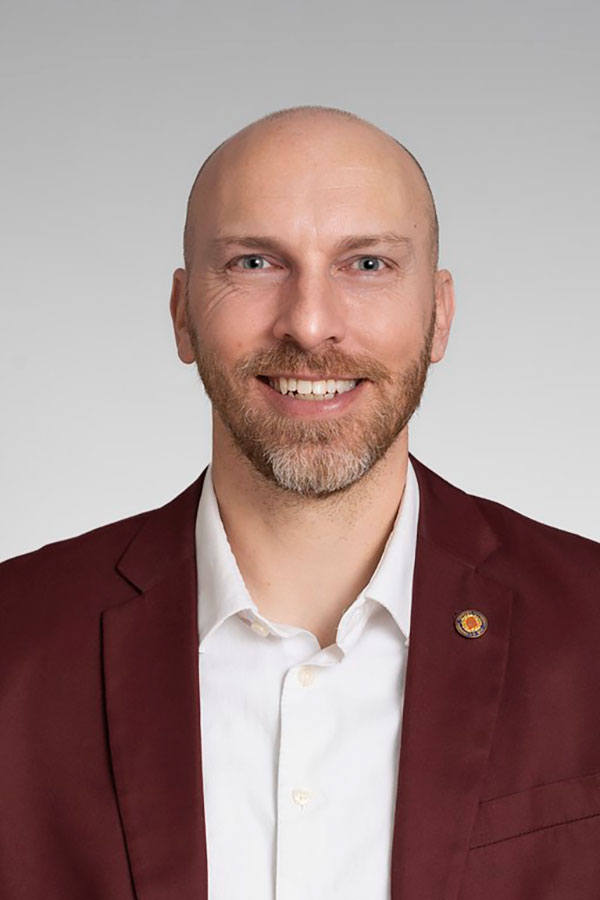
Joey Gawrysiak, executive director of the esports degree program, was hired last August to bring his visionary research and skills to campus, helping Syracuse capitalize on the tremendous popularity of esports while continuing to offer students innovative career options in emerging fields.
“Students will get a world-class education from esports-specific faculty that are at the top of their field in researching and teaching esports, with industry connections that will help you find an experience, a capstone, an internship and a job. That’s part of your educational journey,” says Gawrysiak, who developed one of the first esports degrees in the country at Shenandoah University in Winchester, Virginia. He notes that the best-in-class esports facilities currently underway on campus will create standout opportunities for students to engage with esports and gaming.
On this “’Cuse Conversation,” Gawrysiak discusses the evolution of the esports program on campus, the progress made in its first year, the expanded opportunities available to students and what’s planned for the future.
Check out episode 164 of the “’Cuse Conversations” podcast featuring Gawrysiak. A text transcript is available at the end of this story.
What will set our esports degree program apart and set students up for success?
An esports degree program must include the communications side of the industry—the broadcast and production aspects—and the sport management side, including brand monetization and name, image and likeness opportunities as content creators. Our program pulls on one of the best sport management programs in the country with the Falk College and one of the best communications schools in the country with the Newhouse School.
We’re going to set new standards because of the skillsets and experiences our students go through while earning their degree. The three-pronged academic degree program will ensure our students are well positioned to succeed, both in the classroom and once they graduate.
What lessons did you bring with you from past experiences launching esports programs that have served you well so far in your current role?
I came to Shenandoah as a sport management professor and then developed the curriculum for what esports could look like in higher education. One of the biggest lessons I learned was how the program was based not just in the classroom, but also included running events out of our esports arena that we could use as a lab space for students to understand how to set up for an event, orchestrate a run of show and the broadcast and production that goes into an esports event. It’s important for students to handle tournament operations, advertising, social media posts and the promotional efforts that go with hosting an event, and our students were able to do all that as part of the curriculum to get a degree.
How would you summarize the first year of the program on campus? What were some of the highlights?
The biggest area of growth I’ve seen is helping people understand what esports looks like in higher education and that it’s not just a degree program, a club team, a varsity team or our great facilities. It’s how all those pieces work together to make an esports program under the Syracuse University umbrella. The top-down support we’ve received from Chancellor Kent Syverud and other administrators really is reassuring that we have a great support structure that will turn this program into something meaningful for our students.
The thing I’m most proud of is we had varsity competition for one semester this year. We had a Counter-Strike team win a national championship as the best Counter-Strike team in the country. I was so incredibly proud of what they did and how they embraced going varsity. I’m really proud of the competitive side of our esports program in their first semester of varsity play, and I’m also really proud that we’ve made some great connections for our students that are going to have the chance to work with some of the best esports organizations in the world as part of this degree program.
Listen to the full story…
’Cuse Conversations: Gamechangers – Esports Degree Program Enjoys Successful Launch
Hello and welcome back to the ‘Cuse Conversations podcast. I’m John Boccacino, senior internal communications specialist at Syracuse University.
Joey Gawrysiak:
So I think somebody looking at Syracuse to come and study esports, yes, you’re going to have world-class classes as part of this. You’re going to have teachers that are proficient in their discipline, in sport and in communication. But now you’re going to have esports specific faculty that are top of their field in researching esports, and teaching esports, but also with the industry connections that will help you find a job and an experience, a capstone, an internship, that are part of your educational journey that you’re here. And to top it all off, you’re going to have the best in-class facilities that no other college campus has with what we’re putting together in Schine and in Marley to go with what we’ve already had in Barnes. We’re going to have three massive esports facilities that any university would be lucky to have one of, for our students to have so many opportunities to engage with esports and gaming that you don’t get anywhere else.
John Boccacino:
Our guest today on the ‘Cuse Conversations podcast is Joey Gawrysiak, the executive director of Syracuse
University’s esports, or electronic sports communications and management degree program, which recently concluded its first year on campus. And what an exciting year it has been for our esports community. It’s hard to believe but a little more than one year ago we brought you this emerging topic by breaking down this news with Jeff Rubin, Olivia Stomski and Chris Hanson here on the podcast, discussing the exciting news that Syracuse was creating a new, first of its kind degree program focused on esports. Well, here we are now one year later, we’re having Joey on to discuss the progress the esports program has made, as well as some of the exciting initiatives planned for the program going forward. And for a little background for our audience, Joey is no stranger to developing esports degree programs. Syracuse University is, I believe, the third institution where he has played an integral role in launching an esports degree program, the last of which being Shenandoah University in Virginia. Joey, it’s a pleasure having you on. Thanks for making the time to join us.
Joey Gawrysiak:
Yeah, John, really appreciate it, man. It’s always a fun conversation to talk about all the things that we’re working on, and then it’s intimidating. It’s like, oh my gosh, we still have a long way to go, but we’ve come so far already from being here and having that groundwork initially. So really excited for the conversation today.
John Boccacino:
Give our audience a little background on the program itself and what your role has been serving as, again, that executive director.
Joey Gawrysiak:
This idea of an esports program, and in particular, this esports degree program that we’ve been working on during this past year in what I call year zero, because no students were actually admitted to the program. We actually have that this coming fall, will be the first admitted students. So yeah, I’ll try to give some background about my role, but also how esports in general has evolved on campus and how it’s not just about the academic program. It’s about what student experience has to offer. Elevating that club program to varsity competition. The chancellor approved that term varsity. So we have varsity teams competing for national championships now to go along with the programming that we’re building on the academic side of things and working with partner organizations. So yeah, there are so many different, I don’t know why it was good on octopus. There’s so many different tentacles that esports has and touches on a college campus like Syracuse, and I can’t wait to keep diving into each of these areas and figuring out how all this works together.
So with the degree program, launch this year, year zero, programmed it out, getting the planning, the curriculum set up, the courses, marketing, advertising, all the things that go with it to bring in our first incoming class. So joint degree program, like you mentioned, it was set up excellently by Olivia, by Chris, by Jeff Rubin, and everybody else that worked behind the scenes over the last few years to get it going. So it’s joint between Falk and Newhouse, where the curriculum is split between those two schools.
It is not a dual degree, it is a joint degree, which is confusing in some ways and figuring out exactly how enrollment structures work, how the homeschool idea works about communication to students, the advising opportunities. So it’s constantly a work in progress like, all right, we have this thing that is split between two different schools equally.
How does that actually work? And when I came to campus, I was like, I don’t know, but we’ll figure it out. And my favorite phrase that I’ve learned here, John is, we will get there. And I’m like, okay, that’s cool. We’ll get there. What opportunities can we set up within this academic program for this broader idea of professional development, career preparation that is not just focused on esports careers, but is also focused on those transferrable skills that work across different entertainment sectors and industries so that we’re not here with an esports degree to get somebody to be the next best caster for a rocket league in a professional setting. If that’s a career opportunity that somebody gets, awesome, love it, fantastic. But let’s make sure we’re preparing our students to work across different sectors and industries through this lens of esports and gaming and getting those transferable skills that is also based in experiential learning. Which is what Syracuse has done so well for so long, is making sure the students aren’t just in the classroom learning, but that they’re actually out in the field doing and experiencing and networking to make sure they actually have the skill sets that industry leaders are looking for in that next workforce coming through.
So that’s been a big push for us recently is making sure that we do have those opportunities with those companies and those industries to do that. It’s been a really great start for things. And my job, my position again, has evolved to not only report to Dean Jordan and Dean Lodato and Falk and Newhouse respectively, but working with Jeff Rubin out of the chancellor’s office, but also now working with Allen Groves out of student experience to set up experiences on that side of things too. So it’s been a great start.
It’s been 10 months, it feels like sometimes 10 years and sometimes 10 weeks that I’ve been in the position. So it’s never a dull moment and always exciting to work with great people at the university that’s doing things that nobody else is doing. And we’re one of about 15 or 20 schools that has an esports major in the country, and we’re by far the biggest when it comes to brand recognition and popularity, those kinds of things. So I really like where we are.
Also, the fact that we have the chancellor and the provost supporting these initiatives on campus goes a very long way, because they understand the importance and the opportunity, that educational opportunity that esports and gaming has to offer that is not about playing video games, but it’s understanding the ecosystem and the industry around this idea of video games and competitive video games and all the components that go with it. So even this year, no esports students per se, but we still, in our office space, we had about six to eight students on a daily basis that would just be in here asking us questions, wanted to get involved with the planning, the understanding, the execution of our matches or our competitions or the production, the long form, short form content we were creating. Because it helps them build their resume up and build their portfolio through something that they’re interested in already.
We know these young adults are playing video games. But now with this program, we’re offering them a structured and intentional opportunity to have an educational experience through this new and exciting lens that they value and they love and they’re passionate about, to help them gain those skills and build that portfolio, develop their network of connections in this field, yes. But it touches so many different fields that it’s important for them to understand where their career can go with the knowledge and skills they get through these opportunities.
John Boccacino:
You happen to come from a great school, Shenandoah University in Virginia that actually was one of the first esports programs in the country. What lessons did you take away from that experience that have served you well so far in your current role here at Syracuse?
Joey Gawrysiak:
Yeah, that’s a great question. And I love my time at Shenandoah. It was a fantastic experience. I came there as a sport management professor. That was my background, was teaching in sport management. And then I developed the curriculum about, at this point, it’s about seven, eight years ago, geez, that makes me feel old. That I started working on this curriculum for what esports could look like in higher ed. And I think that what was so great about the program down there is that it was all in one school. It was in the business school down there, and I had the varsity programming. I had the facilities that we were building at the same time I was writing curriculum. And what was great, and this is one of the biggest lessons I had I wanted to carry over, was that it was really based in not just being in the classroom.
It was also based in hey, running events out of our esports arena that we could use as almost like a lab space for students to be in, not to play video games, but to understand different setups for an event, understand a run of show and broadcast and production that goes with running an esports event. We could have local high schools come in and have a competition in our space, and we could have our students doing the tournament operations, do the advertising, social media posts, do the videos, the editing, the graphics, everything that goes with an event, hospitality, all this stuff that goes with an event. Our students can now do that as part of the curriculum to get a degree, which I thought was great. Because honestly, somebody looking at an esports degree on a resume, it’s like esports degree, okay, “They played video games and got a bachelor’s in that? What does that mean?”
I want that to pop out and people to say esports degree, tell me about what that means and what you did? And our students can talk about not just being in a classroom listening to somebody like me talk and blab on, but actually being in the field in an arena or off campus running an event and talking about all the things that go into that planning, the organizing, the execution of those events. So at Shenandoah, one of the biggest things I learned was how to write experiential learning based curriculum. And that’s something I wanted to make sure that we had here, those experiences. Something else was the value of global experiential learning to go with that. So how do we take students abroad? How do we work with organizations and schools in other countries to give students that chance to connect with students from other countries that have very different backgrounds, very different cultures, but have a shared commonality of esports and gaming to work on projects or experiences with?
How do we take our students out to South Korea or to Amsterdam or to London or to Dublin or the other places that Bangkok that we traveled to, with students to work with organizations in the esports and gaming industry to get their connections, to develop their network. But maybe most importantly, just have global competencies to understand how the world works, that it is not all about what’s going on at the time in Virginia or here, what’s going on here in New York, but what’s going on abroad? What’s going on across borders? How do I navigate that landscape when I might not speak the same language as that person I’m trying to work with? I think those are important ideas as well that I wanted to make sure to bring here to implement international programming as part of the experiences our students have.
So yeah, I take a lot of lessons I learned at Shenandoah, and I bring them here to Syracuse. Because I see it as a very similar conceptually program with the academic component, the facilities, the varsity component. It’s just elevated to such a higher degree here at Syracuse because it’s a very prestigious and historical university. So we want to make sure that we are carrying on that legacy of what has made Syracuse so fantastic and now implement something brand new to it and learn lessons along the way and make mistakes along the way because that’s how we get better as long as we learn from them. But I take so much from Shenandoah and that opportunity I had to even get started, and I’m trying to bring that here now. It doesn’t always look the same. It’s going to look a little different everywhere you go, but conceptually, a lot of the same ideas are brought up here with me.
John Boccacino:
What do you think it was about yourself, your background and your work experiences that you feel made you the right person to lead this program?
Joey Gawrysiak:
Yeah, number one, I know how to talk, unfortunately. It’s true because a lot of people that maybe are working in this space or are traditional gamers, they’re introverts, they don’t have the same social skills and know how to present themselves and sell. For lack of a better term, sell themselves to prospective donors or recruits or corporations for partnerships, sell themselves to administration to get the point across about the importance of esports in higher ed. But I think it’s also my background. My background in that I am traditionally from academia. I came through the University of Georgia, got my undergrad and masters and PhD, which I know is maybe not the best idea to get all three from the same school. So having that traditional academic background of scholarship, I did a lot of research. I’ve published a lot of journal articles, done a lot of presentations at different conferences over the years.
So having that background paired with starting a program exactly what Chancellor Syverud wanted here with a strong academic programming, with varsity and enhanced competitive experiences, with designing facilities that would go with all parts of recreation, student experience, competition, academics, professional development, hosting events, international travel, experiential learning. All of those same things that I was doing at Shenandoah and had experience in, Chancellor Syverud wanted here. And that steering committee was very clear. We need somebody that has done this before, has worked in this space. I’m like, “Well, that’s what I’ve done the last five years.” So I think I was really lucky to get the opportunity to come here and work with some great people because of my background.
But I also want to make sure I brought not just the academic background to this position, I wanted to make sure I did bring in that varsity competition background and that opportunity for students to come here to compete at the highest level against other schools around the country at that highest level. Scholarship opportunities, national championships, jerseys, coaching, travel, all the things that go with it. Because I saw the value that brought at Shenandoah, so I wanted to bring that here as well. So I think not only my background in traditional academia, the fact that I have a terminal degree in, I don’t want to say the field because there is no terminal degree in esports, but my research was in esports and video games for several years and I made a lot of presentations on that.
So I think having all those experiences really was the reason I was brought in. And I’m learning new things along the way. Fundraising, I was never good at fundraising, never really had to do that at Shenandoah. Here it’s like, all right, what are we doing for fundraising? I’m like, all right, let’s explore this chance. And that’s where the talking and the gabbing comes in, the fact that I have to sell myself on some things and sell the program on some things. So I think that’s why I was brought here is that, that really holistic background I had and experience I had that honestly, there might be one or two other people that have that same experience I’ve had if that many in the country.
John Boccacino:
And when it comes to, you mentioned a couple of times the core tenant of the… And we’ll get into the recreational sports and the varsity sports component because that’s fascinating to me. But I want to do a little more on the academic side of the house. And with the three-pronged degree program having esports business and management, esports communications, and esports media and design, all of these arms have been well calculated to set up our students for success, both when they’re in the classroom and then once they graduate from Syracuse and go out to be difference makers in the world. What did you love about the way the degree programs were set up that really played to your strengths, your research background, and how you could help these students reach their goals?
Joey Gawrysiak:
There were a couple of things that really I love. I love the fact that it pulled on two of the strongest schools and colleges at Syracuse, and not just at Syracuse, two of the best. One of the best sport management areas and programs with Falk in the country that everybody knows about, everybody hears about. But also with Newhouse, I mean, there’s nothing that compares with Newhouse around the country for a school of public communication. So it’s like that’s a no-brainer to me. And one of the things I’ve always said to people is that an esports degree program has to talk about the communication side of the industry. It can’t just be about the business or sport business side of the industry. There has to be a component that students can learn about, content creation, monetization of brand, name and image and likeness opportunities like we hear in athletics, but this time is with content creators.
The ideas of the behind this camera in front of the camera operations, full-fledged production because that is not my background, but I knew how important it was in the esports ecosystem, and I knew that I wanted that as part of what a degree offering would be. And when I was here touring and I saw the Newhouse spaces like the Dick Clark Studios and other spaces in there, I was like, 1000% I’m sold. This is all I needed to see, knowing that this could really be a difference maker for students. Because again, it’s not in a classroom. These are studios that don’t just replicate what you see in the professional industry. They are the professional industry. They literally are being used for professional industry experiences. I’m like, yes, if we can get our esports students to being able to understand how something at that level works and then take their understanding of esports, not only are they going to be well positioned to be successful, they’re going to be well positioned to accelerate the esports industry coming from Syracuse alums.
We’re going to set new standards because of the skill sets and experiences our students go through while getting their degree because of the strength of Newhouse that we are pulling in on for part of the esports degree, because of the strength of Falk and what we’re pulling in as part of that esports degree. So now I’m so lucky because I get to take the best of both worlds and put that together in this giant snowball and I guess snowball’s appropriate because in Syracuse. Put this giant snowball that I can start rolling down the hill, and really it starts picking up momentum, picking up steam. Students are working with each other, pulling on different experiences.
So those three prongs that you mentioned, one more Falk oriented, two more Newhouse oriented, I think they are so well positioned that we can really get things started in a meaningful way that other schools, they’re already looking at us. They’re already asking me, “How did you start this program?” They can really look at our students now when they graduate, and they can work with our students to help them set up programs at other institutions or professional industries. And it’s not only that, John, it’s like I also want to make sure we’re starting to tap into Whitman and entrepreneurial opportunities. Make sure our students understand business finance and economics and things that go on in Whitman. Make sure we understand what’s going on in the iSchool or engineering, and pull in some of those tenants and those courses as well. Because the ideas of computer science, game design.
While that’s not “esports directly,” there are a lot of overlaps and parallels with the esports industry and game design and content creation that go with the engineering as well as the analytics and the iSchool. Dude, I get so excited with all the different opportunities that esports has to touch so many different areas of campus, and I think we’re just getting started. But seeing that it started in Falk and Newhouse, which is exactly where my mind always has gone with understanding that sport management side of things and the broadcast and production side of things, I was like, this is already set up perfectly for me to come into and hopefully start filling that cupboard up.
John Boccacino:
When do you think that became the reality where the switch flipped from esports being gaming and a fun passion to an actual career opportunity?
Joey Gawrysiak:
Obviously, yes, we are there and people are like, they want to go to school, they want to study to work in esports. But even with a lot of students that we get as part of this program, or even my time at Shenandoah, a lot of students came in, they just wanted to play. They wanted to compete. Yes, they were taking the degree program. But a lot of them still wanted to compete. And then at about their junior year, after their sophomore year, they’re like, you know what? I’m not going to be a pro gamer. It’s something I was telling them the whole time because I was like, “Guys, you are not going to be a pro gamer, sorry. Top 1% make it as a career and you’re not the top 1%. I hate to burst your bubble, but it ain’t going to happen.” So they’re like, okay, well what can I do to leverage my knowledge and passion of esports to find a career?
So they will then start working more on the sales, the development, the marketing, the branding, the social media, the broadcast production. They will switch from playing and competing while also studying and going to class to just working as a work study position and professional development while also going to class. So I think that that change happens. For some students it happens in high school that they think, all right, this is a career. And I think that age continues to get lower because they’re starting to see more opportunities not just as careers, but also in college. And the curriculum is starting to evolve, not just to be college curriculum, but to be high school curriculum where you can take esports courses now in high school that can feed into college. So I think just as we continue to evolve as a discipline, that age is going to keep getting lower, that people can realize that they can go into esports or gaming or entertainment as a career opportunity and not just as a pro gamer.
So I think that’s where we are. That light bulb doesn’t switch on for some people as early as we want it to. But at some point during their college career, while they’re here, we make sure that we are constantly in front of them making sure they understand, there are real opportunities to study esports and gaming from an academic discipline that lead to career opportunities. And it’s not playing games or on keyboard and mouse. It’s not doing that. It’s through the lessons you learn through understanding that, but not just about playing the game.
John Boccacino:
What would you say to a prospective student or a parent or family member who listens to this and the light bulb goes off in their head that they might want to pursue the esports program? What are the best benefits of coming to Syracuse to study here under Falk, under Newhouse and under the Syracuse umbrella?
Joey Gawrysiak:
Yeah. The biggest benefits is, like I mentioned earlier, you are studying under Falk and Newhouse. This is not this new independent thing that doesn’t pull on the strengths that are already here at Syracuse. So we’re not reinventing the wheel, we’re just making a better wheel that makes sense for esports. So it’s something that you get to be part of Falk and you get to be part of Newhouse as part of this degree program. But we’re also pulling our connections and our alum network that are based out of Los Angeles. And a lot of students working in the gaming and esports industry. So students that come to Syracuse, they’re going to have a chance to travel to Los Angeles and work with Gen.G or Team Liquid or Riot Games as part of their experiences here. As part of the experience, they’re going to be able to travel to Washington DC and go meet with monumental and other entities down in DC that are part of the esports organization because of the umbrella and the network that we have here.
So I think somebody looking at Syracuse to come and study esports, yes, you’re going to have world-class classes as part of this. You’re going to have teachers that are proficient in their discipline in sport and in communication. But now you’re going to have esports specific faculty that are top of their field in researching esports and teaching esports, but also with the industry connections that will help you find a job and an experience, a capstone, an internship that are part of your educational journey that you’re here. And to top it all off, you’re going to have the best in-class facilities that no other college campus has with what we’re putting together in Schine and in Marley to go with what we’ve already have in Barnes. We’re going to have three massive esports facilities that any university would be lucky to have one of if for our students to have so many opportunities to engage with esports and gaming that you don’t get anywhere else.
We have the, and I’m sure we’ll get into this, we have the largest staff for esports on any college campus. And that’s some on the academic and some on the student experience side. We have the most work study opportunities. We have the most facilities. We are competing and engaging in so many different levels that if you want to have any experience in and through esports and gaming, there is no place that’s doing what we’re doing here. So that’s the biggest thing that we talk to parents about is, “What does your son or daughter like to do?” “Oh, they’d like to stream their stuff.” Cool. Here are seven different streaming rooms that we have, and here are some streamers that we work with on a daily basis that could talk to your son or daughter about how to set up a stream and how to monetize their branding through that stream in a way that makes sense.
We’re not just going to throw them to the wolves and say, “Streaming. Cool. Good luck. Go find a PC on your own.” We’re going to support students every step along the way as part of the program here.
John Boccacino:
And that’s really reassuring. Again, given the fact that with this program we just wrapped up year zero in the fall, we’ll have students admitted for the first time. So how would you summarize the first year of the esports program on campus, and what were some of the highlights you’re most proud of?
Joey Gawrysiak:
It’s been a whirlwind. It’s been a lot of fun. It’s been a learning experience for sure, not just for me, but for me educating and working with other people across campus. For me, the biggest area of growth that I’ve seen is that getting people to understand what esports looks like in higher education and that it’s not just a degree program. It is not just a club team. It is not just a varsity team. It is not just a facility that you’re throwing money at to make it look really cool and sound really cool. It’s how all of those pieces work together to make an esports program. Not an esports major, not an esports team, but an esports program under this awesome S right here.
So that’s the biggest thing that I’m most proud of is that people were starting to coalesce and not have siloed approaches to what esports can be on campus. We’re bringing it all under this esports broader umbrella to make sure that all those entities are working together. The sum of everything we do is so much greater than those individual parts that we were offering initially to students, which were great, and it’s fantastic that we had some offering for students. But seeing the top down approach and the value that the chancellor and other administrators have for what esports can be, is really reassuring that we are going to have that support structure for us to really go for this and make it something meaningful for our students. So our varsity teams, they don’t operate in a silo. Our varsity team works with our production area to make sure they coordinate the schedule and information and analytics and graphics and headshot and media that goes that they need. All of that has been an experience just to get things set up and structured how they can work most effectively and efficiently as a holistic program.
The thing I’m really, really proud of is also the fact that we had varsity competition for one semester. So we had clubs, they were competing on their own. In January, I had a full meeting with all of our students that wanted to keep competing, and I said, “All right, we’re going to offer the chance for you to be varsity competition starting this spring semester. If you want to be varsity, there are certain expectations you will have. And there are time commitments, GPA requirements, blah, blah, blah. If you want to remain a club, because that’s what you want to do and just have fun and play together, cool, we will support you still, but you will be on your own a little bit more. More freedom, but not as much support from the university.” So some teams decided they wanted be varsity, some wanted to stay club.
Of those varsity teams, we had a Counter-Strike team, one of the games we compete in, they won a national championship. They were the best counterstrike team in the country. I’ve got a three-foot tall trophy sitting right outside my office. Because this team had got to go down to Orlando and compete against the other top schools in the country that were on full ride scholarships. And our players are on no scholarships for esports, but they still won a national championship. I was so incredibly proud of what they did and how they really embraced this idea of varsity. And it wasn’t them, our Rocket League team did the same thing. They finished 12th in the country out of 400 teams. So very, very successful.
They won the first ever ACC member championship for Rocket League as we were competing against SMU, Florida State, Miami, Clemson, and other ACC schools. So we got some bragging rights already going on for the best ACC school. So really proud of that competitive side in the first semester of varsity. But I’m also really proud that we’ve made some great connections for our students that are going to be part of this major to work with some of the best esports organizations in the world. Like I mentioned earlier, Team liquid, Gen.G, Riot Games, Xbox, Samsung, Sony, EA. We’ve got great connections with all those companies for our students to work with immediately as part of this degree program.
John Boccacino:
If you look into your crystal ball, what types of expanded opportunities do you think will be available to our students moving forward?
Joey Gawrysiak:
Once we reach our final form as a program, some of the opportunities are things that we want to do like working events. We want to be hired by convention visitors bureaus from around the country. So CVBs in Indiana and South Carolina and New York. I want them to hire our students and our program to run an event for them completely offsite where our students get to plan in everything from start to finish and run the event, get paid for it, get a great experience, get great networking, awesome, put that on their resume.
I want that to be something we do on a yearly basis. I want there to be expanded international opportunities. There has to be international components that our students can study abroad in South Korea for a full semester or London, or Germany’s got a great scene. France has a great scene. Where our students can go abroad and for an entire semester and study esports, but also work with international companies that are in and around the esports and gaming industries.
I want us competing on the competitive side. I want us competing for ACC and national titles on a consistent basis in two or three different titles. And I want to continue to bring events here to campus. I would love, and John Wildhack would love it, Kent Syverud would love it. So many people would love it if we can bring a massive esports event and put it in the dome. That is something I hear over and over is get, League of Legends or get Valorant or get something, get Call of Duty to be in the dome at some point. I’m like, that is really ambitious because that’s like what, 40,000 seats or whatever it might be. An esports event might get 400 people, 500 people. There are maybe four events a year that get to that 20 to 40,000. And they’re typically in New York City or Seoul, South Korea, these major metropolitans. So if we could get something like that to Syracuse, New York, I mean mind blown. You’d know we’ve arrived. You know we got the best program.
John Boccacino:
People might not believe there are hardcore intense practice sessions that go into these esports games. There’s communications lessons, there’s comradery. How does an esports student athlete demonstrate that comradery, that communication, the skills needed to reach the pinnacle?
Joey Gawrysiak:
Yeah. A lot of it is communication. It’s just like any other sport. It’s constant communication and teamwork and practice. So our students do have very intense practice sessions. They have what we call VOD review, video on demand, where they’re watching gameplay of scrimmages they have. Scrimmages are so important in the competitive esports space compared to more traditional sports because you can play a team from anywhere in the world online right now. So coaching, VOD review, breaking down film, knowing tendencies, and this is where this is really cool. This is where we’re going to tap into our analytics programs at Syracuse that are sports analytics, best in the country. No question about it. We have data analytics out of the iSchool that are amazing as well. So we’re going to tap into those students and get them involved with our teams to start tracking progress and trends that they have. And then reporting back to help our coaches with the analytics part of esports that is incredibly untapped.
So hopefully that we can elevate our players to even higher level based on analytics and science now, not just on how they play and how they communicate. But we are constantly talking about, hey, who’s the IGL, the in-game leader, who’s making the callouts for what’s going to happen in the game? How are we communicating that to each other effectively and efficiently so that things aren’t getting jumbled and they’re not trying to talk over each other during a competition? So it’s listening to communication. It’s breaking down gameplay, looking at mechanical ability as well as mental ability and understanding gameplay and mechanics that go into it. But it’s always, it’s playing with each other. It’s constantly playing with each other intentionally to get better so that you can. It’s not just playing the game to have fun, unfortunately.
The game should be fun, but they’ve got to take it seriously. They’ve got to make sure they’re grinding and putting the time in needed for an hour or two a day in practice, and then going to class. It’s not about playing for six or seven hours a day and not doing something and getting anything out of it. It’s about playing for one or two hours intentionally to work on a skill to get them better at the game. So we treat it just like any other sport. We’re going to work with psychologists, work with nutritionists.
We’re going to work with physical trainers to make sure they are in good shape, mentally, physically, emotionally, to compete at a high level for a longer period of time. We’re going to tap into that science side of things with the analytics. We’re going to work with team psychologists. Psychology is right in the same building that our esports program will be in. So it’s like a perfect marriage. So yeah, we really want to really capitalize on all those different areas because all of those skills are what’s needed to take somebody to make them a really high level player, just like in traditional sports.
John Boccacino:
And it’s really remarkable. I mentioned earlier the growth that esports has seen. I saw a recent study from Pew saying that 90% of teenagers between the ages of 13 and 17 play video games in some way, shape or form. That’s clearly got to be music to your ears as future potential students and student athletes to bring here to Syracuse’s program. What do you attribute that rapid growth and interest in esports and video games to?
Joey Gawrysiak:
Kids are digital natives. It’s accessible. It’s accessible like it never has been before. And it’s largely because of this thing that’s in my pocket right now. That I could pull out and I could play a video game on right now. And the mobile gaming industry, it’s not the same as the esports industry unless you’re in Southeast Asia where mobile gaming is the biggest form of esports. But I’ve heard those same numbers. But I’ve also heard numbers that 99% of all boys and 94% of all girls play a game before age 12. And what other activities even close to that? Nothing. So yes, we know that people play video games. We know there’s an interest in video games, so how do we set this up to intentionally have an educational opportunity that utilizes and harnesses that power and impact that gaming can have to teach people skills that are transferable and important for valuable careers across different industries?
That’s the whole point of an esports degree program. That’s the whole point of professional development through esports and gaming. These they’re very real world skills. But it makes me very excited and I hate trying to forecast and guess on anything in the future, but I feel really safe where we are with the value and passion that gaming has and the fact that kids growing up today are digital natives and they’re understanding what, not just esports and games are through different devices, but just how to engage in social media, how to engage with YouTube and people that are out there and talk to people through this right here, like Zoom, like Teams. That you’re not picking up a phone and calling somebody, you’re doing a video chat through something like this for meetings and social experiences, and they’re making friends with people around the world that they’ve never met in real life.
So how do we harness this new age, this new digital age that we’re getting into through this idea of entertainment and technology that is esports and gaming, just like we’re looking at AI and VR and robotics and other STEM and STEAM fields. Esports is that entertainment component to STEAM education.
John Boccacino:
With this ever evolving industry, what’s next? Where else can this industry be headed when it comes to the academics and then the esports competitive side of it as being varsity athletes?
Joey Gawrysiak:
Yeah. I think it is understanding that the continuing evolution of technology, AI being a major part of it. But I think AR VR is another part of it that we need to understand. Esports in particular, will there be like virtual reality esports? Of course there will be. There already has been. They haven’t been as accessible or available to people as other esports have been. So I think as we look at trends for the future and the education, it’s an understanding of technology more all encompassing and how we utilize technology not just for entertainment like the esports industry is in, but also for other areas of industries, whether it be religion or work or economy or education. How we utilize technology and computers and all the equipment, all the hardware, all the software that comes with esports and gaming and streaming, and how we utilize all that in a way that makes sense across other industries. I think that’s a big part that we need to keep an eye on.
But for the esports industry in particular, it’s understanding AR VR. It’s understanding mobile gaming a little bit more and how to get things a little bit smaller. But also the biggest key phrase is accessibility. How do we make this more accessible and equitable to make sure that we are encouraging and including everybody we can through these mechanisms? There are some DEI initiatives in place that the esports industry is not good on different diversity standards right now. It is very white male or Asian male. So how do we get more people included? How do we get more people, more backgrounds included in this space? I think that’s a big thing that we’ve got to figure out as an industry as well. And I think it’s lowering that barrier to access, lowering that barrier to entry. So getting things cheaper, getting things more accessible, those are going to be some of the big trends that we see in this industry going forward.
John Boccacino:
I can’t wait to see what happens moving forward in the fall with students being admitted for the first time to the esports program here at Syracuse University. Joey, keep up the great work and thanks again for making the time to talk with us.
Joey Gawrysiak:
Awesome, John. Really appreciate it, man, and happy to be here. Really excited for the conversation we had today and really appreciate your time as well.
John Boccacino:
Thanks for checking out the latest installment of the ‘Cuse Conversations podcast. My name is John Boccacino, signing off for the ‘Cuse Conversations podcast.
A Syracuse University News story by John Boccacino originally published on June 25, 2024.
Falk in Australia
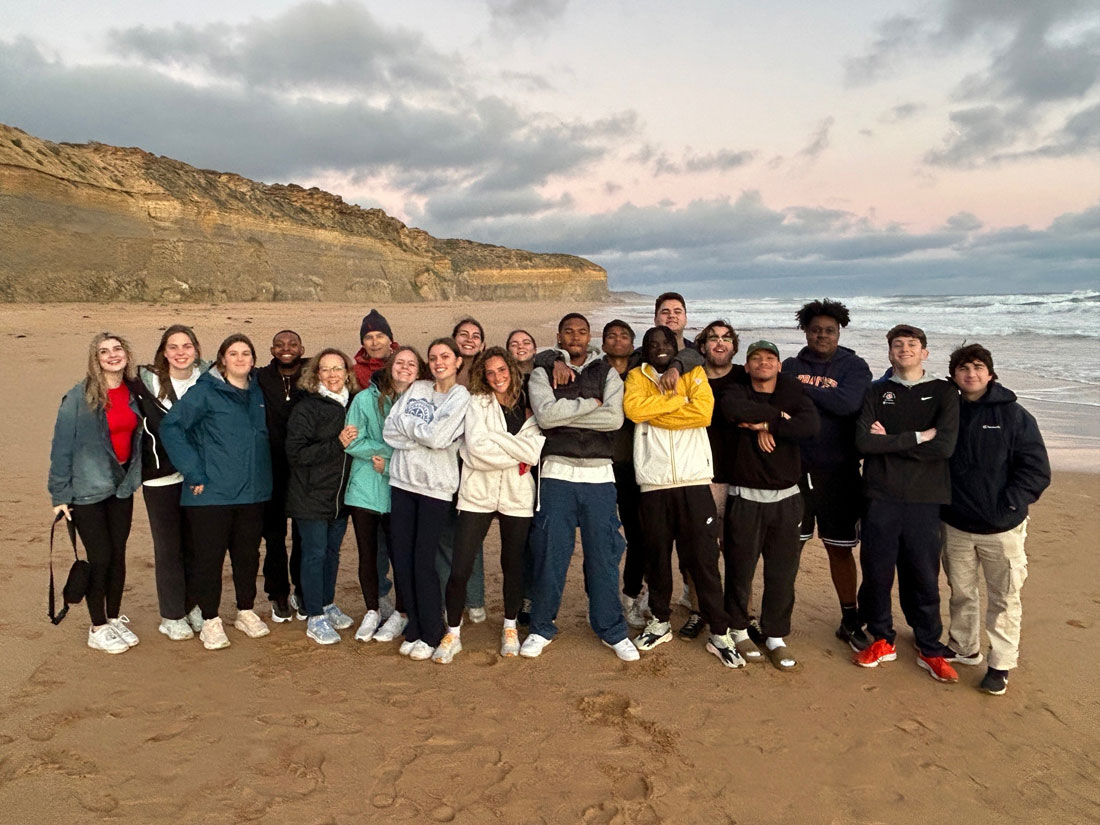
From mid-May through early June, 19 students from Syracuse University–including 14 from Falk College–spent the start of their summer in Australia for the “Australia: Sport, History and Culture” class taught by David B. Falk Endowed Professor of Sport Management Rick Burton.
For nearly three weeks, the students traveled from the Melbourne Cricket Ground to Cairns to the Great Barrie Reef to Sydney, Australia’s largest city. As part of their immersion trip, each student was required to contribute to Aussie 24, a blog that captured their day-to-day experiences.
The entire blog is worth your time, but here’s a video and daily excerpts from the blog to get you started:
The Day Before: Kate Bradley ’26 (sport management major)
Currently, all of the students are working on writing research papers to prepare us for this trip and give us background knowledge on the various topics we will be learning during this course. My research paper topic reflected on the Australian Football League Women’s (AFLW) and female leadership and representation within that league. The entire league is full of successful women the prioritize supporting each other and encouraging diversity within the league.
I am looking forward to landing in the beautiful city (of Melbourne), grabbing a cup of famous Australian coffee, and heading to the Melbourne Cricket Ground for a tour of their facilities to kick off our week in Melbourne before we depart for Cairns.
Day 1: Ethan Canals-Fernandez ’27 (sport management)
Today is day one of travel for most, but for me I am already halfway to Melbourne! I decided to leave a day earlier to be able to acclimate to the time difference before the fun begins. I am extremely excited to learn about the rapid growing sports culture here as well as attending some local games.
Each student wrote about different things, but for (my research paper) I chose to write about economic growth as well as racial issues in sports in Australia. Through this paper I was able to see how rapidly the sport sector is growing and the positive affect it has on the economy.
Day 2: Elizabeth Carchia ’26 (chemical engineering)
At 1:15 p.m., after a warm shower and change of clothes, the whole group of us set off to Melbourne Cricket Arena, where we were able to get a tour of the facilities and watch some professional players warm up. It was here we were able to learn more about the Australian Football League and its significance to Australians.
After our tour or the facilities and the museum we headed back to the hotel for a quick rest before we got dinner at a local food market. I am looking forward to catching up on rest from our long days of travel and watching a real Australian football in person tomorrow!
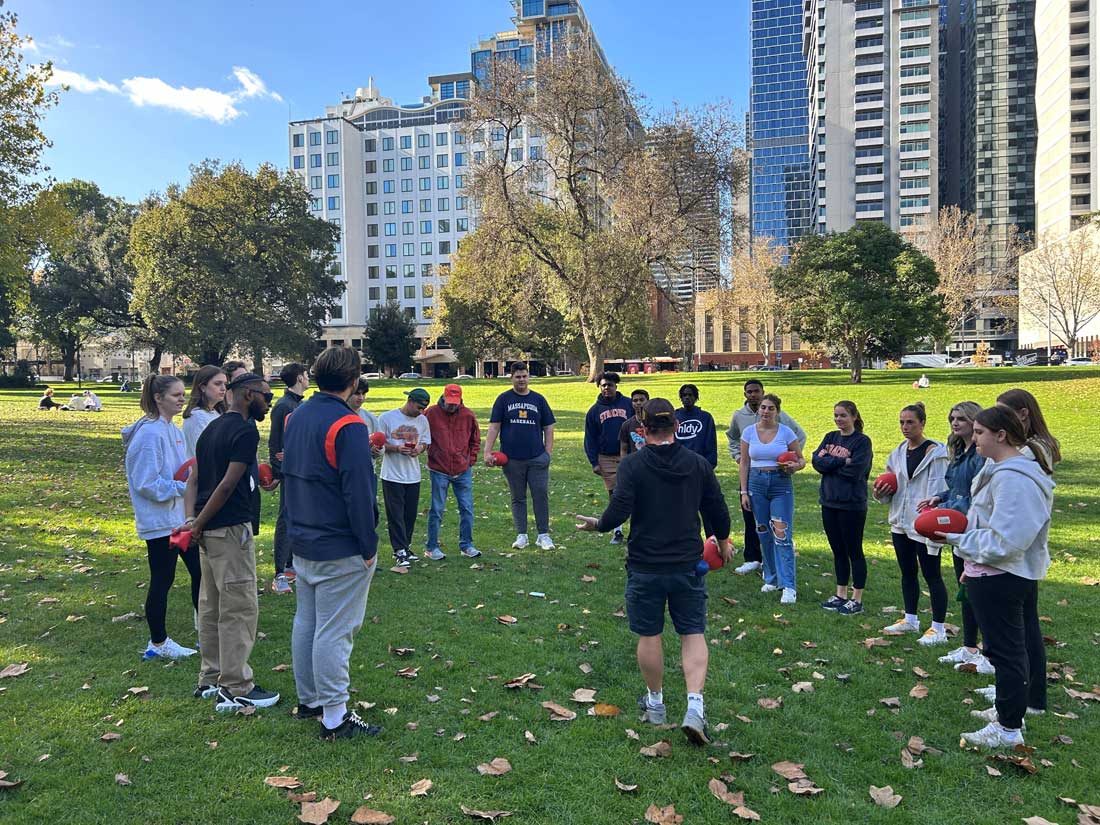
Day 3: Julia Cronin ’26 (sport management)
Our group walked to Victoria University, where we met with Dr. Matthew Klugman, who was kind enough to come into work on a Saturday to teach us about the history and rules of Aussie Rules Football as well as the social impact of the game. After a captivating lecture, our group got lunch and headed to Flagstaff Gardens Park with Damian Hecker (“Damo”) to try out Aussie Rules Football! We started out with drills and then played a scrimmage game. I even surprised myself and scored a goal.
Later, we watched the St. Kilda Saints vs Fremantle Dockers at Marvel Stadium (in Melbourne). We all got dinner at the stadium, and many tried the famous Australian meat pies and kangaroo meat! Our group was able to understand the game much better after getting the chance to play it ourselves in the park earlier. Unfortunately, St. Kilda (Professor Burton’s favorite team) didn’t pull off the win but the game was so fun to watch nonetheless.
Day 4: Sean Cullen ’26 (sport management)
We were given a day today to explore the city of Melbourne, and some of us headed off to the Sea Life Melbourne Aquarium. While seeing penguins for the first time was surreal, looking at large sharks a couple of days before going scuba diving may not have been the smartest move of the afternoon.
My last activity of the day was dining at a restaurant called “Ghost Donkey,” solely because of the name. While I expected a Mexican-style restaurant, it turned out to be a very relaxed and calm bar/lounge with beautiful decor. After about an hour of just hanging around there, we all departed and went back to our hotel to prepare for an early morning tomorrow.
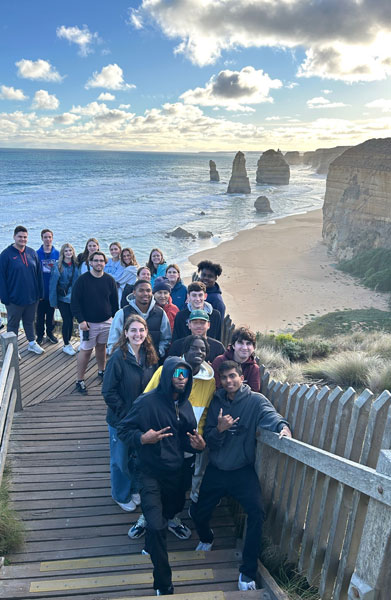
Day 5: Liam De Vos ’26 (education)
Today the group went on a massive road trip along the Great Ocean Road. We saw beautiful sight after beautiful sight, getting amazing photos and memories captured over the course of the day.
We made a stop to see some koalas, but the birds stole the show and I was able to get some birds to land on my arms. After lunch, we took a very scenic route where we saw amazing views as the sun was starting to set and we ended the day at McDonalds to feel at home. It was truly an amazing day that I will remember forever!
Day 6: Finley Dermody ’27 (sport management)
This morning, we started our day with a walk to the Twenty3 Group’s office, where we met with CEO Mr. John Tripodi. He gave us a presentation on the (marketing) company that he started himself. He started out in the candy business, then moved to hair care brands, and then to starting his own agency. It was fascinating to hear about his journey.
Next, we heard from Mr. Raphael Geminder, a Syracuse alum and chairman of the (packaging company) Pact Group who flew in from Europe to speak with us. Mr. Geminder shared his experiences at Syracuse University and talked about sustainability initiatives at Pact. He talked about the circular cycle compared to the linear cycle, as well as the importance of a good role model over a good job.
At 2:15 pm, we walked to the Melbourne Museum and had the chance to explore the museum prior to the official tour. We then had a guided tour at the Bunjilaka Aboriginal Cultural Centre from 3:30 pm to 4:30 pm. The tour was very educational and gave us a deeper understanding of the Aboriginal culture and history.
Day 7: Edison Friday ’27 (sport management)
The flight to Cairns wasn’t too bad, just about 3 hours long. After landing safely in Cairns, our guide took us up the mountains where we eventually learned about the culture of the Djabugay people.
The Djabuygay people were the nation’s first people whose culture and stories were represented through the voices of the Pamagirri guides who work at Rainforestation (National Park). We eventually made our way to what I call a “bird sanctuary,” and our last stop was the sky rail before we eventually made our way home.
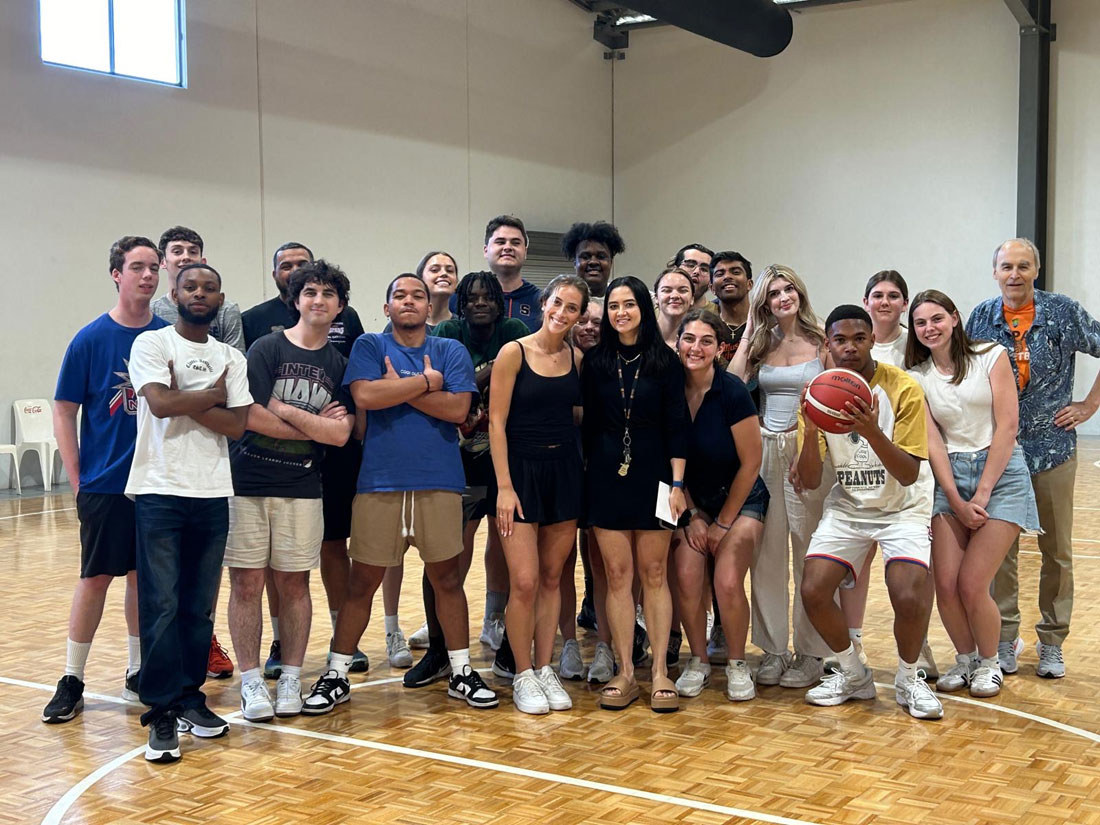
Day 8: CJ Green ’26 (sport management)
The day started with an excellent presentation by Dr. Glen Deakin, who discussed the health of Indigenous communities, particularly in the Solomon Islands. His talk was thought-provoking and made me reflect on our privileges and the things we often take for granted.
After the presentation, we visited the Cairns Taipans Basketball Club. Playing basketball and touring the facility, especially the recovery room, was definitely one of the highlights of the day. It was interesting to see how the club’s facilities compare to the NBA facilities.
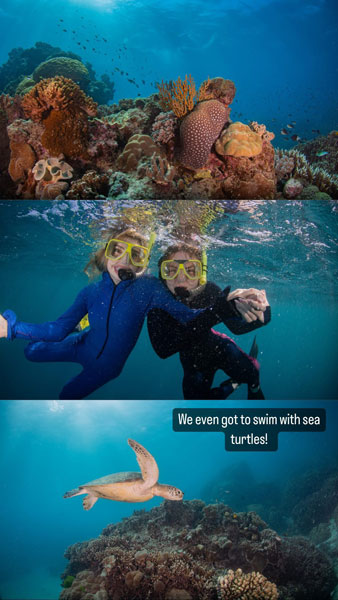
Day 9: Anna McDonald ’26 (sport management)
The trip to the Great Barrier Reef took about two hours through rough ocean waters. On the way there the boat crew taught us about the marine life we might see, proper scuba diving and snorkeling techniques, and told us what to expect from the day.
Arriving at the reef was beautiful, from the boat you could see some of the corals and the water was very blue. I got the opportunity to scuba dive for the first time, and it was one of the coolest things I’ve ever done. I got to see some many different types of fish and all the corals. After the first dive we ate lunch and had the opportunity to dive or snorkel again, this time I just snorkeled, which was just as cool.
Day 10: Johann Perera ’25 (sport analytics)
Today we had a free day to explore Cairns. So of course, I decided to do a free fall 14,000 feet in the sky. Anna, Dante, and I took a one-hour drive south in order to make this bucket list experience possible. And after a two-minute debriefing and 20-minute plane ride, my instructor decided it was time to kick me out of the plane. It was one of the most incredible experiences of my life.
Later, Dylan, CJ, and I went to the Cairns Dolphins’ (basketball) game. Even though the arena was small, the atmosphere was great. We watched the entirety of the women’s game. It would’ve been much better if they won, but instead they lost by 40. It was still a great experience.
Day 11: Dante Reese ’26 (sport management)
Growing up in Los Angeles, my elementary school mascot at Kentwood Elementary was a koala. Today, that childhood memory came full circle as my group and I had the chance to pet and take pictures with a koala at Hartley’s Crocodile Adventures. We also fed and petted kangaroos, took a boat ride through a crocodile-infested swamp, and watched an engaging crocodile show where we learned about saltwater crocodiles.
After our thrilling time at the zoo, we visited Palm Cove Beach, where we swam in the warm ocean waters. We were also treated to ice cream by the generous John Tripodi (first introduced in Day 6). Thank you, Mr. Tripodi, for taking the time to inspire us with your success story. I was truly moved by how one can create such a successful business through experiences in various occupations.
Day 12: Leda Rossmann ’26 (history)
We arrived in sunny Sydney very excited for warm weather since it’s been pretty rainy in Melbourne and Cairns. We drove to Bondi Beach to visit the legendary Bondi Icebergs Swimming Club. The pools are saltwater and freezing cold. I was so excited to jump in. I was a competitive swimmer for most of my life so the water is one of the most calming and nostalgic places I can be.
Our amazing bus driver took us on a guided tour of the Sydney sights. We saw The Gap and heard the story of Don Ritchie, who saved at least 180 people who were going to jump off the rocks. We also saw Lady Macquarie’s (rock) Chair, where she would look into the harbor to watch for ships bringing news of her family during the early colonization days. We saw some of Vivid Sydney, a light/art show in the harbor with lights into the sky and on the bridge and art projected onto the Opera House and other buildings.
Day 13: Dylan Taylor ’26 (sport management)
To start off our second day in Sydney the group traveled to University of Technology Sydney for special lectures from Prof. Burton’s good friend, Dr. Daryl Adair. The first lecture was an overview of Australia and its history as well as some of its pillars of society. The second lecture was very special about the history of race in sports as it relates to Australia. This was a treat as the lectures were informational, engaging, and eye opening.
After a nice lunch break, we went to one of Australia’s most famous landmarks, the Sydney Opera House. This time we were able to attend an hour-long guided tour through the building. I found the story of the architecture and the history of Aboriginals prior to the building’s construction to be the most interesting.
Day 14: Cate Vickery ’26 (sport management)
Today we had our lecture of the day in the morning at the University of Technology Sydney. The lecture was about the history of politics and geopolitics within the Olympics and what that’s going to look like this year at the 2024 Paris Olympics. After our short lunch break, we went over to the UTS’ main campus area, where we met Fadi Chadayda, who works for a company that helps organize and create esports locations and events in universities and other spaces.
We got to see a few different esports rooms, with the main one sponsored by Red Bull. It was very cool because everything in that space was sponsored by Red Bull or other companies to help promote esports. Fadi then gave us a presentation on esports in Australia, the history of it, and where he thinks it will go in the future as well as what his company does and what his job is.
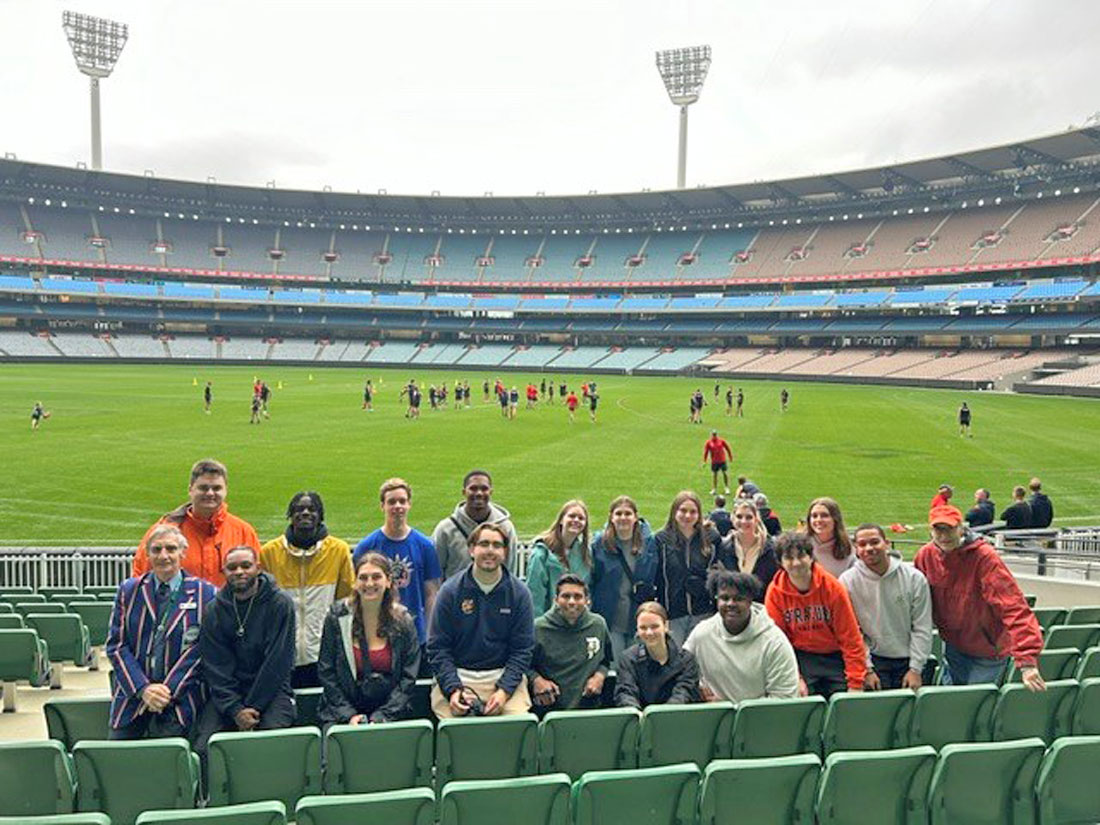
Day 15: Doug Capdeville ’24 (communication and media studies)
After spending time on the beach and listening to a presentation about the local surf club, we headed to the Cronulla-Sutherland Sharks rugby facility. There, we got to learn how to play rugby. The staff was super friendly and taught us the basics, which was really fun. We even got to try out some drills ourselves.
After that, we sat through a lecture by the Sharks’ staff. They talked about the team, their strategies, and what it’s like to be part of the rugby community. It was really interesting to hear about the behind-the-scenes stuff.
The day ended on a high note with an exciting Sharks game, which was about an hour away from the rugby facility. The atmosphere was incredible—fans were cheering, and the energy was off the charts. The game was intense and really fun to watch. From the beach to learning rugby and experiencing a live game, it was a day filled with awesome memories.
Day 16: Aylee Weiss ’25 (broadcast and digital journalism)
Today was our free day in Sydney so Kate Bradley and I decided we had to catch some waves in one of the best surf cities in the world. We hopped on a ferry and headed to Manly Beach just outside the city of Sydney.
We had a blast catching waves with our surf instructors for about two hours, and we could’ve stayed out there longer. We were having a blast. Later we then headed to Coogee beach to walk around and get some things for us and our families. We wrapped up our day watching the sunset on the beach and then got a quick dinner and headed home to get some sleep.
Day 17: Thomas Wildhack ’26 (sport management)
After an unforgettable two weeks, the final day had arrived. Fortunately, we had had another free morning, which gave some of us the chance to fit in one last adventure, and others to catch up on some much needed sleep.
I had previously found out that not only was June 1st the first day of winter, it was also the first day of whale season. All of the humpback whales would begin a great migration from Antarctica up the coast of Australia in search of warmer waters. I figured that whale watching would be a great way to go out on a big splash. Once we made our way into the ocean, it didn’t take long to find some activity. A few whales were splashing around, and swam over to the boat to show off their skills. I thought the whales would be sacred of the boat, yet I learned many whales are incredibly curious creatures and often approach boats.
We finished off the trip with one final group dinner at the Great Southern Bar. We reflected the on our favorite moments of the trip, and took one final group photo. All of us couldn’t believe how fast these last few weeks went by. We made memories that will last a lifetime, and bonds that will last forever.
Day 18: Robert Yardley ’26 (sport management)
Unfortunately, our time in Australia together has reached its conclusion.
These last few weeks as a group have flown by, and most of us are left feeling that it all ended too soon. However, there is no doubt that the learning experiences we have shared and the memories we have created together will be with us for the rest of our lives. Most of us came to Australia as strangers to each other, but we all left as a family.
Visit the Department of Sport Management to learn more about other experiential learning trips, academic programs, and career opportunities.
Four Days in Philly
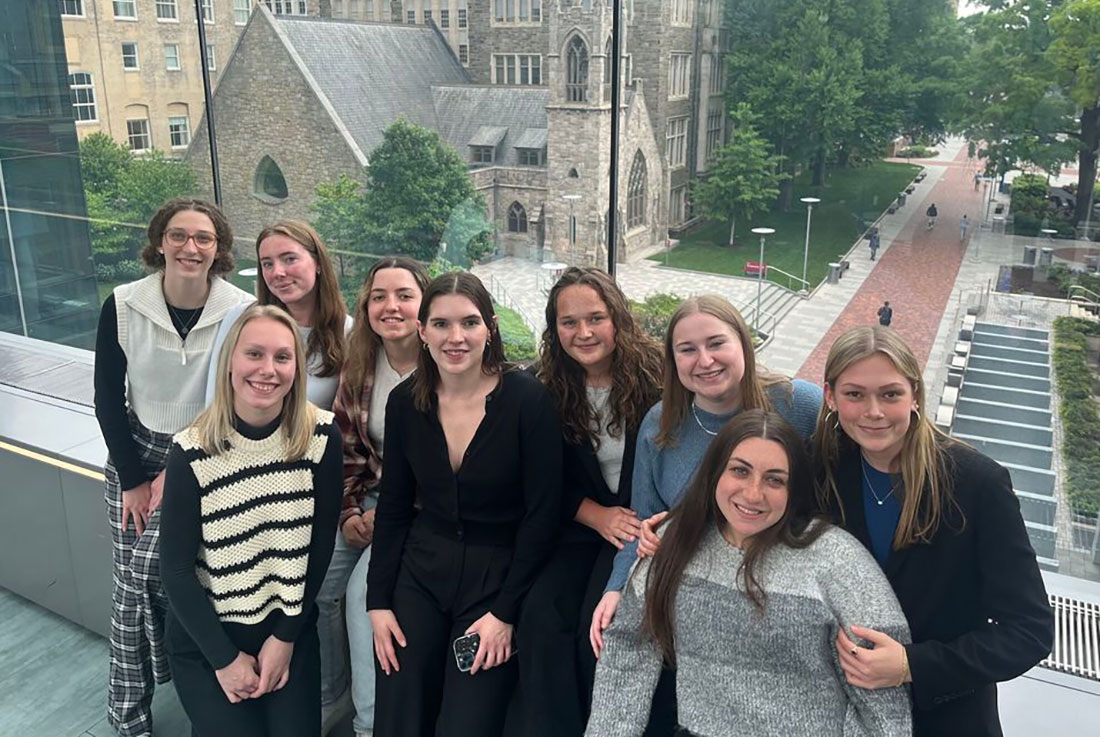
The city of Philadelphia is one of 12 cities that host teams in the “Big Four” major sports leagues in North America: the Phillies of Major League Baseball (MLB), the Eagles of the National Football League (NFL), the 76ers of the National Basketball Association (NBA), and the Flyers of the National Hockey League (NHL). Also, the greater Philadelphia area has been the home of the Union of Major League Soccer (MLS) since 2010.
In addition, Philadelphia hosts numerous sporting events throughout the year, including collegiate events and international competitions at world-class venues such as Citizens Bank Park and Lincoln Financial Field.
Over the course of four days in May, nine female students from Syracuse University’s Falk College of Sport and Human Dynamics visited Philadelphia to meet with numerous sports organizations and more than 25 sport industry professionals. The meetings included executives from several sectors of the industry, including PlayFly Sports, Zelus Analytics, Harris Blitzer Sports and Entertainment, Philadelphia Phillies, Philadelphia Union, Leveling the Playing Field, Temple University Athletics, and the Major League Baseball Players Association (MLBPA). The group also attended a Phillies’ game.
Jake and Suzanne Doft have sponsored the trip for the past three years in honor of their daughter, Class of 2022 Sport Management graduate Dara Doft.
The students on the trip included Jacqueline Dipaolo, Charlotte Howland, Kate Hubbard, Livia McQuade, Erin Moore, Marni Nirenberg, Brooke Siket, Ashley Stewart, and Allison Vilms. The students, all members of the Women in Sports and Events (WISE) Club from the Department of Sport Management, were accompanied by internship placement coordinator Beth Perez and Sport Analytics program coordinator Jackie Dorchester.
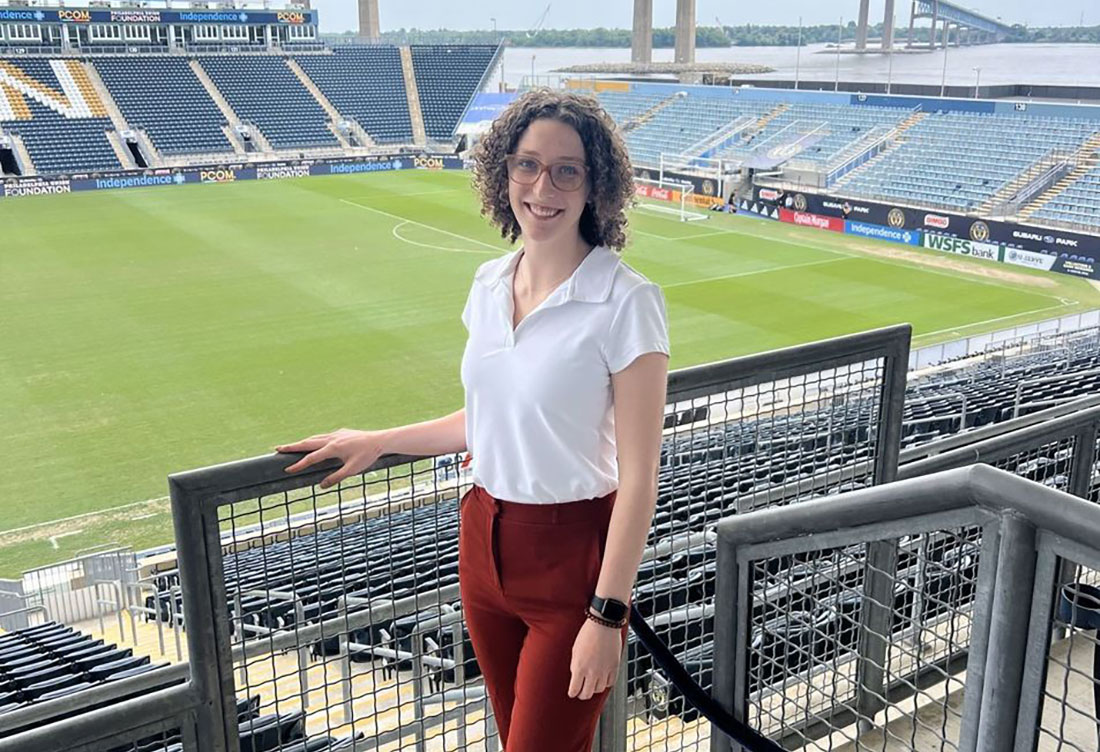
We asked McQuade ’25 to share her experiences and thoughts about the Philadelphia immersion trip, and this is what she wrote:
“This year’s WISE immersion trip to Philadelphia was nothing but extraordinary! We are so thankful for the incredible generosity of Mr. and Mrs. Jake and Suzanne Doft and their family for sponsoring this experience, and to the Department of Sport Management at Falk College and our two advisors, Beth Perez and Jackie Dorchester, for coordinating an amazing agenda.
“Our first day kicked off with an on-site visit to Playfly Sports, a sports marketing, technology, and media organization that supports brands, teams, and leagues. We gained a great perspective about mergers and acquisitions and the marrying of clients and brands, and topped off our visit by playing basketball on their indoor court.
“On day two, we headed to the Philly city limits to meet with the MLS team, the Philadelphia Union. A panel of Union executives gave us in-depth answers about both the Union’s and the league’s community-driven initiatives, as well as how they market themselves in a city that is both so passionate about, and saturated with, sports. We came away with great advice, and even snapped a picture at the corner of the pitch!
“After visiting the Union, we made our way back into the city to meet with a panel stacked with Philly-centric executives who represented Learn Fresh, Harris Blitzer Sports & Entertainment, the MLBPA, and Zelus Analytics. With such a wide range of perspectives and sectors present, the group answered questions ranging from entrepreneurship, community relations, player performance technology, workplace dynamics, and even sports betting.
“To wrap up day two, we journeyed on a historic walking tour through Philadelphia, seeing everything from the Liberty Bell to Betsy Ross’ house to where the Declaration of Independence was signed, and even the ‘oldest continuously inhabited residential street in the United States.’ Our biggest takeaway: There wasn’t anything Ben Franklin couldn’t do.
“We kicked off day three by meeting with various individuals at Temple University, including the women that lead Temple athletics who gave their insight on NIL (Name, Image, and Likeness) and how we can build communities with other women as we enter the industry. We then met with students from Temple’s Women in Sport and Recreation Management (WSRM) Club. It was an exciting and comforting experience to exchange ideas between the clubs and make new connections with aspiring industry leaders.
“In the afternoon, we toured Lincoln Financial Field, home of the Eagles. We saw the broadcasting suites, locker room (featuring the team’s Lombardi Trophy), press room, and the NFL’s first sensory room. They played the runout sequence (flashing lights, music, signs) as we walked through the team’s tunnel onto the field! Needless to say, it was a one-of-a-kind experience! On top of everything else, we learned about what goes on behind the scenes at an NFL venue. I task you to look up how much maintenance goes into just the grass at Lincoln Field.
“We wrapped up the day by attending a Phillies’ game. Our pregame activities consisted of a networking event with some of the Phillies’ powerhouse women in brand marketing, legal, graphic design, sponsorship, special events, broadcast technology, and retail marketing. They answered our questions, and we came away with new industry connections. When the game started, we made our way to our seats and met back up with the students from Temple’s WSRM Club to enjoy a great game against the New York Mets.
“On our last day, we had the privilege of meeting with Leveling the Playing Field (LPF), a non-profit that combats the barriers to sport by redistributing sports equipment to local teams and leagues in need at no cost. LPF was started by Syracuse alumnus Max Levitt ’11. The company has distributed $14 million of equipment and impacted more than 100,000 youth in sport.
“Our group loved meeting with LPF! We learned about their partnerships with the Philadelphia pro teams to collect equipment, the true difference they are making for youth teams and athletes, the life-changing impact they have on female athletes, and the sheer amount of equipment they have in their warehouse that is free for those in need.
“Our group is thankful for this experience, to all the industry professionals we spoke with, and for the incredible generosity of the Doft family. We recognize this was an extraordinary opportunity that will catapult us as we prepare for our careers in sport, and we will never forget it.”
Livia McQuade ’25 is a sport management major and a sport event management minor in the Falk College of Sport and Human Dynamics. She is executive vice president of the Sport Management Club and co-chair of the 2024 Charity Sports Auction. She’s currently a summer athlete relations intern for the Olympus Sports Group, where she’s assisting U.S. athletes before and during the Paris 2024 Olympics and Paralympics.
Focused on Future Success
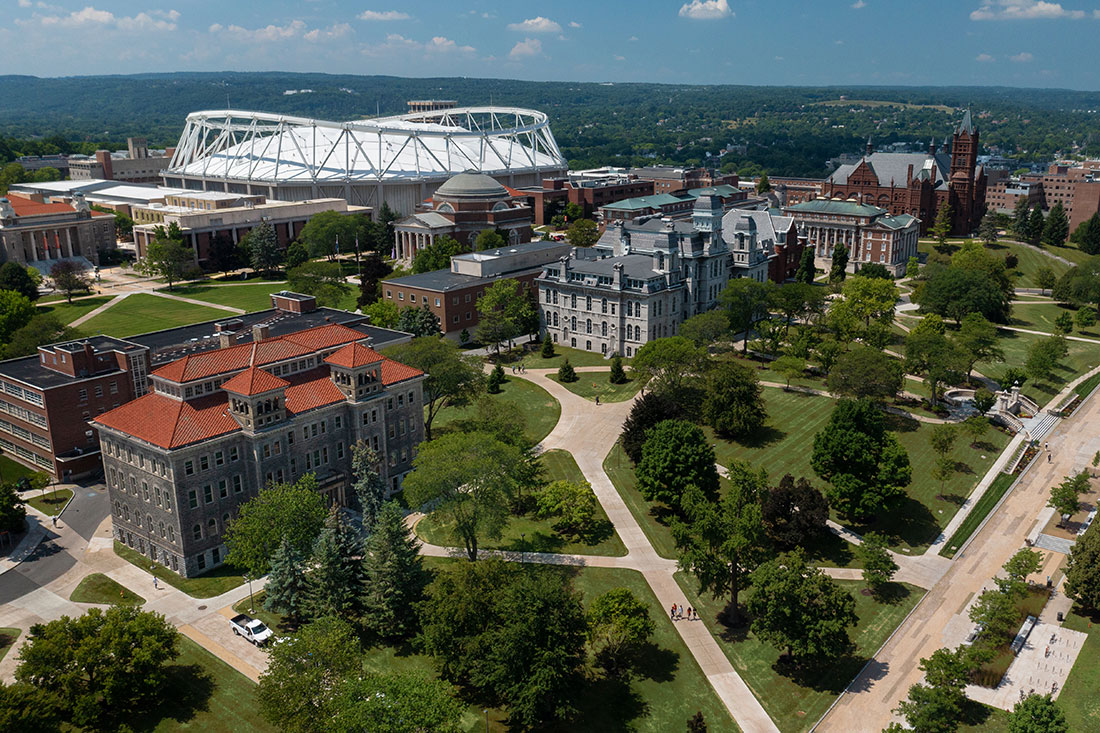
A task force charged with the reimagination of Syracuse University’s human dynamics academic programs has been convened by Vice Chancellor, Provost and Chief Academic Officer Gretchen Ritter.
The work of the Human Dynamics Task Force will focus on programs in human development and family science; marriage and family therapy; public health; and social work with the aim of positioning them for future success by leveraging opportunities and expanding impact. Those programs have long been housed in the David B. Falk College of Sport and Human Dynamics which, as announced in April, will become the David B. Falk College of Sport and focus exclusively on sport-related disciplines.
“The human dynamics programs have played an important role in the history of our University, and have had a significant impact on the communities they serve,” Provost Ritter says. “With the transformation of Falk College comes a unique opportunity to take a thoughtful approach to ensuring the future success of these programs and the continuation of that legacy.”
The first meeting of the task force was held May 28, and work will continue throughout the summer. A final report will be submitted to Provost Ritter by the end of October.
Members of the task force include:
- Lois Agnew, associate provost for academic programs (co-chair)
- Rachel Razza, associate dean for human dynamics, Falk College (co-chair)
- Colleen Cameron, professor of practice of human development and family science, Falk College
- Marcelle Haddix, associate provost for strategic initiatives
- Jody Levison-Johnson, Falk College Advisory Board
- Melissa Luke, Dean’s Professor, School of Education
- Kenneth James Marfilius, assistant dean for online and distance education and associate teaching professor of social work, Falk College
- Sharon Owens, deputy mayor, City of Syracuse
- Ian Richardson, assistant director of undergraduate admissions, Falk College
- Ann Rooney, deputy county executive for human services, Onondaga County
- Tracey Reichert Schimpff, member, Falk Faculty Council and associate teaching professor and graduate director of marriage and family therapy, Falk College
- Merril Silverstein, professor of human development and family science and Marjorie Cantor Professor of Aging Studies, Falk College
- Yvonne (Eevie) Smith, associate professor of social work, Falk College
- Maureen Thompson, associate professor and undergraduate director of public health, Falk College
- Dyane Watson, professor of practice and chair of marriage and family therapy, Falk College
- Ryan O. Williams, associate dean, College of Professional Studies
A Syracuse University News story by Wendy S. Loughlin originally published on June 6, 2024.
Extra Points
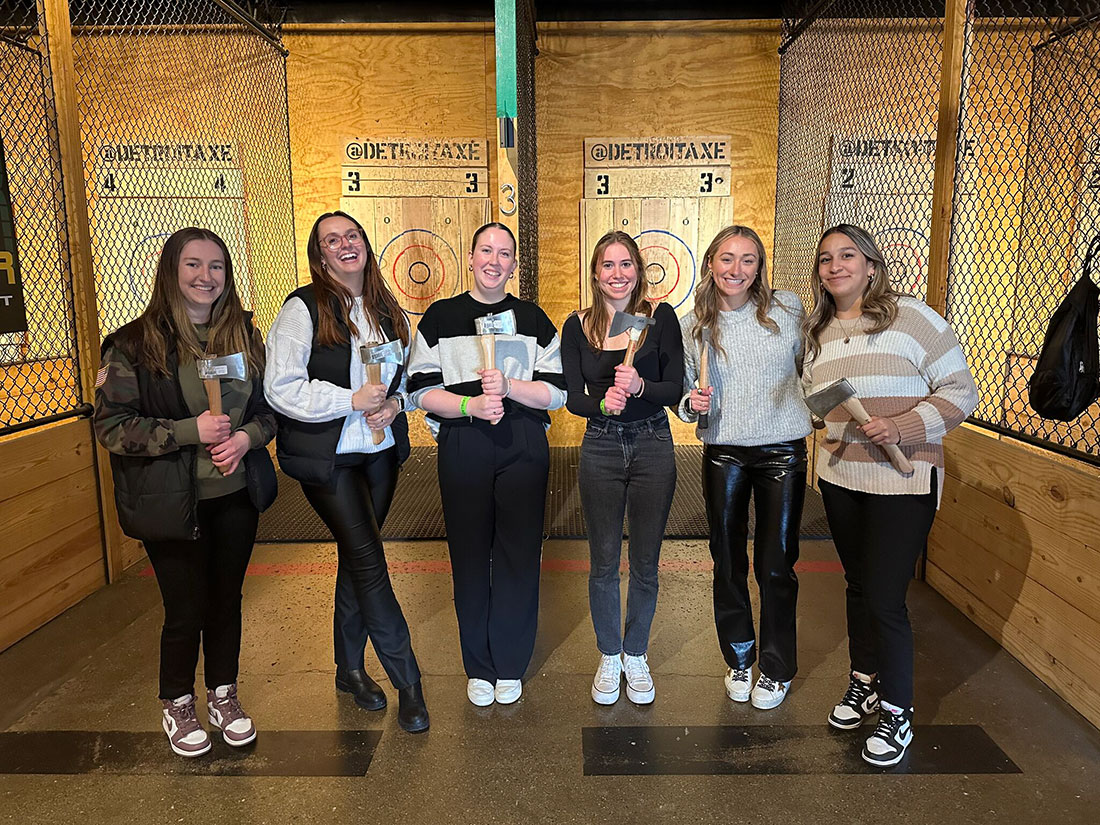
And with the first pick of volunteers for the 2024 NFL Draft, the Detroit Sports Commission selects . . .
Falk College sport management and sport analytics students!
For the NFL Draft in late April, the Detroit Sports Commission and Visit Detroit – the city’s visitors bureau – did indeed utilize the talents of six female students from Falk College’s Department of Sport Management: Aryssa Hopps ’25, Grace Froehlke ’26, and Alivia (Ava) Uribe ’26 from Sport Management, and Anna Pierce ’25, Madelyn (Maddy) Forster ’26, and Claire Patin ’26 from the department’s Sport Analytics program.
During their three days in Detroit, the students worked a variety of volunteer roles, visited with female executives from the NBA’s Detroit Pistons, and networked with Syracuse University alumni at a dinner hosted by David Katz, chair of the Visit Detroit Board of Directors and the parent of a Syracuse University student. The students were accompanied by Sport Management Internship Coordinators Beth Perez, who organized the trip, and Aaron Knighton.
Perez says the genesis of the trip was a conversation between Falk College Dean Jeremy Jordan and Katz, who believed students would benefit from volunteer opportunities at the draft. In discussions with the Sport Management team, Jordan suggested that this experiential learning opportunity be reserved for female students, and Perez thought that was “a fantastic idea.”
“There’s a push for female leadership and providing opportunities for females in the sport industry,” Perez says. “As we know, they’re still the minority within the industry, so we wanted to make it a point to bring the most students we could to get this experience.
“As soon as we mentioned the NFL draft and having the opportunity to go, they without hesitation said yes, even before they figured out their schedules,” Perez adds.
To better understand the impact of this trip, we asked two of the students – sport management’s Hopps and sport analytics’ Patin, to share with us the highlights of their experience in Detroit. Here’s what they wrote:
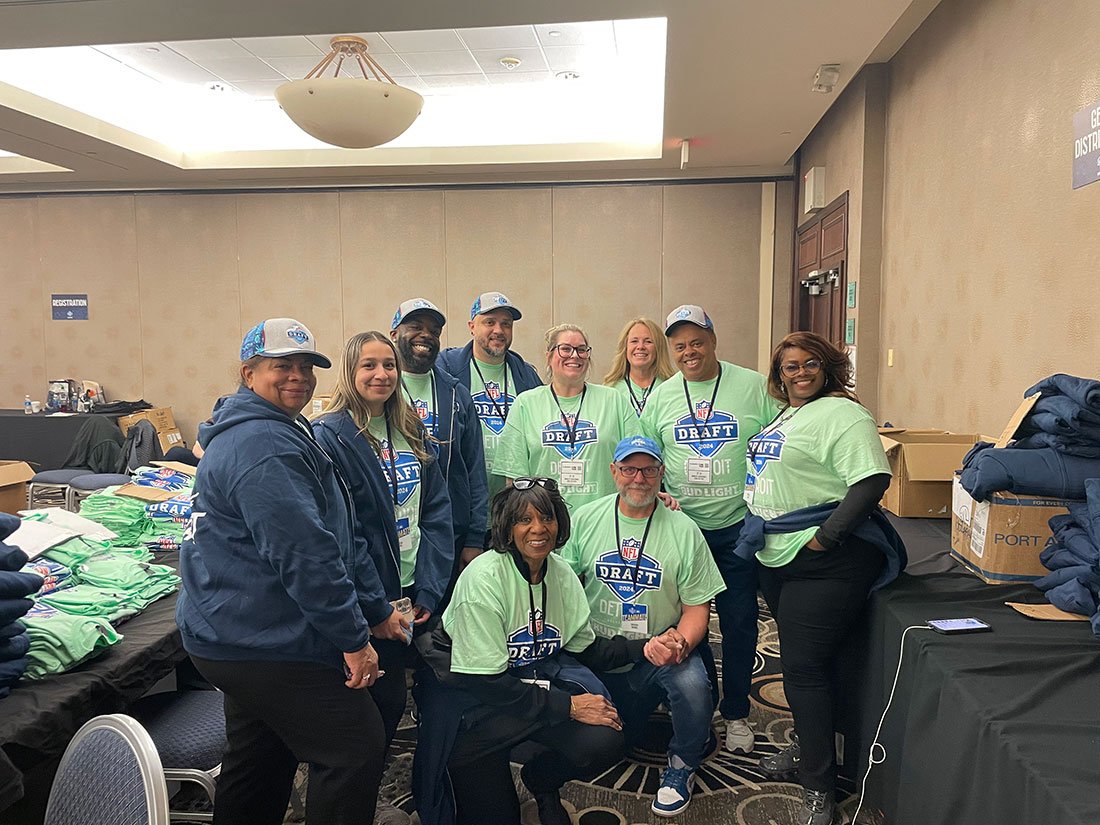
Aryssa Hopps
“My time working in Teammate Headquarters at the NFL Draft was truly an unforgettable experience. I was the first interaction all volunteers had before starting their shifts with the draft, meaning I was able to have an impact on every individual. Whether it be offering a warm greeting, asking them if they were excited about the draft, or just chatting about our favorite teams, I felt as though every person that I met truly impacted my experience in Detroit.
“Most volunteers lived in Detroit or other areas of Michigan, and others were from surrounding states. It was inspirational to hear the stories and different backgrounds from everyone I worked with. Every person had a different reason for why they wanted to volunteer and give back to the city of Detroit.
“While I was inside during my shifts at the NFL Draft Experience and not outside with all the activities like the other women on our trip, I wouldn’t have wanted my experience to be any other way. I was able to form friendships with the small crew that I worked with who made a lasting impact on my impression of Detroit. Over the course of two days, our crew became so close we all signed up to volunteer to work the 2025 NFL Draft in Green Bay, where we hope to meet up again someday.”
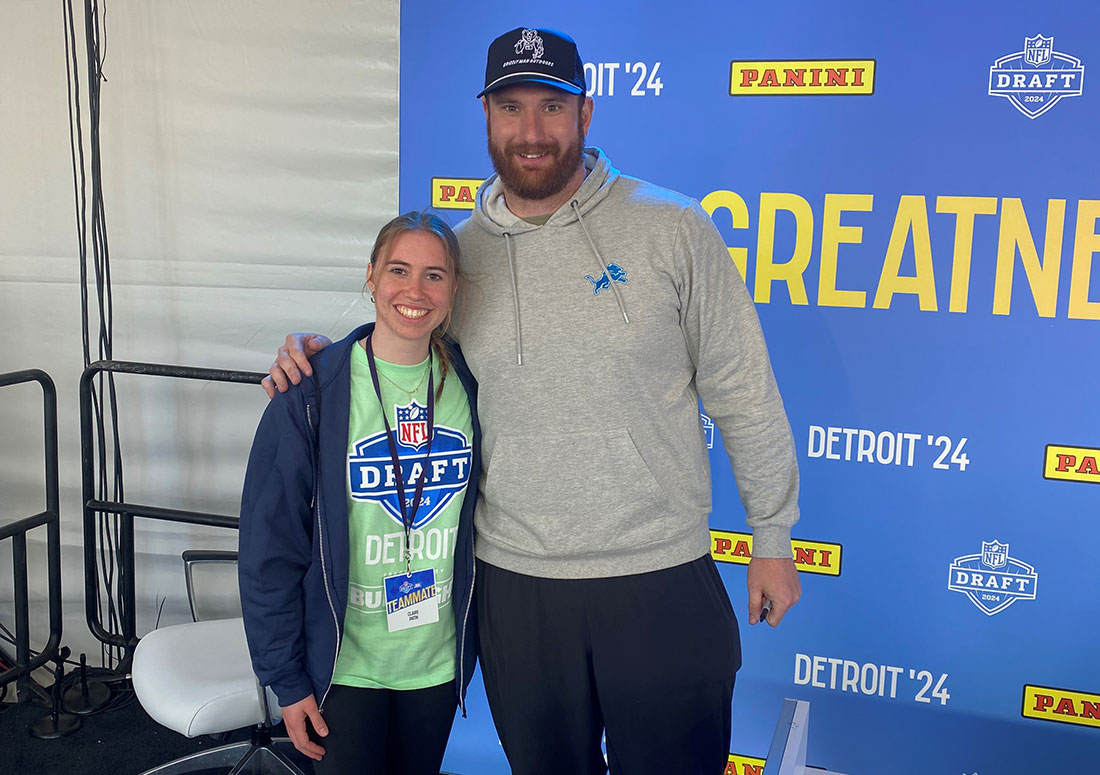
Claire Patin
“While in Detroit for the 2024 NFL Draft, me and my peers had the opportunity to experience so much in such little time. The night before the draft, David Katz hosted us as well as other Syracuse alumni in his home for a dinner and networking event. There were people from all different classes and majors from Syracuse, most of them working in the sport industry in some type of way. It was amazing to talk to everyone and build connections with them. There were so many successful people in the industry I want to go into in one room, and it was a great opportunity to have conversations with all of them.
“The first day of the draft, I worked at the autograph signing tent helping with the lines, directing people, and taking pictures of fans with players. One of the players signing autographs was Frank Ragnow, a center for the Detroit Lions, who was a fan favorite. It was fun to see fans so excited to meet him and be right there to take their picture with him.
“I love the culture that sports creates, and I got to see this with hundreds of people who wanted an autograph from their favorite player. All of the fans were so nice, and just so excited to be at the draft. I feel really lucky that I not only got to experience it myself, but also be a part of the positive experience for the fans. Overall, it was an unbelievable experience to be working the NFL draft.”
As with an NFL team after the draft, Perez and Knighton went back to work soon after returning to Syracuse to start looking at opportunities for next year and beyond for female students and all students from Sport Management. For example, after the positive experience the students had in Detroit, they’ve already started talking about how they can get students to the NCAA men’s basketball Final Four in Detroit in 2027.
“We have a good push for elevating our female students and trying to provide them experiential learning and leadership opportunities and now we can be strategic and build partnerships to make that happen,” Perez says. “We definitely have the mindset of, how can we provide more of these experiences for all of our students?”
Visit the Falk College website to learn more about the Department of Sport Management and its academic programs, experiential learning, and career opportunities.
High Impact
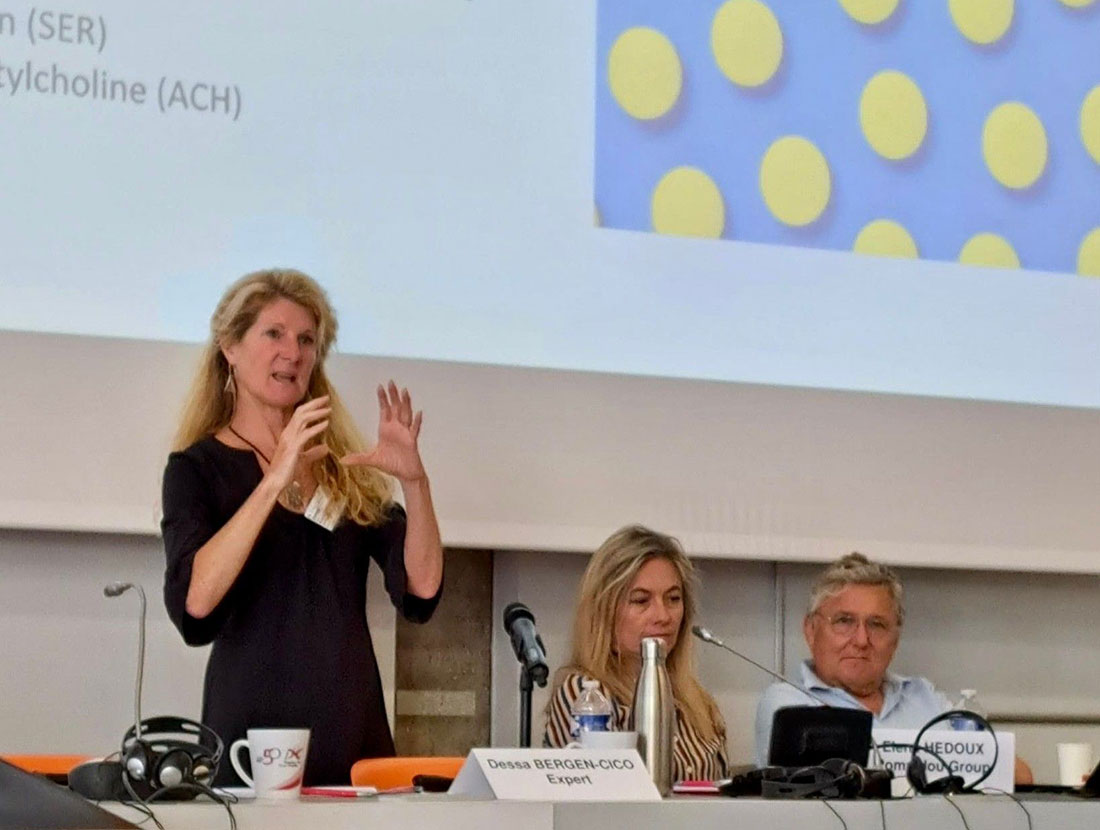
Dessa Bergen-Cico, professor and graduate director in the Department of Public Health, has been selected as the Falk College of Sport and Human Dynamics’ Honors Core Faculty member for a three-year term starting this May.
Renée Crown University Honors Program Core Faculty help shape the Honors Program curriculum and policy, and assist with strategic planning. Their academic vision and scholarly rigor guide the Honors Program in matters crucial both to the larger Honors faculty and to Honors students.
At Syracuse University, Bergen-Cico is coordinator of the Addiction Studies Programs, faculty in the Interdisciplinary Neuroscience Program, and a research affiliate for the Lerner Center for Public Health Promotion at the Maxwell School of Citizenship and Public Affairs. She was selected as Falk College’s Honors Core Faculty member by a four-person committee in consultation with Falk Dean Jeremy Jordan and Honors Program Director Danielle Taana Smith.
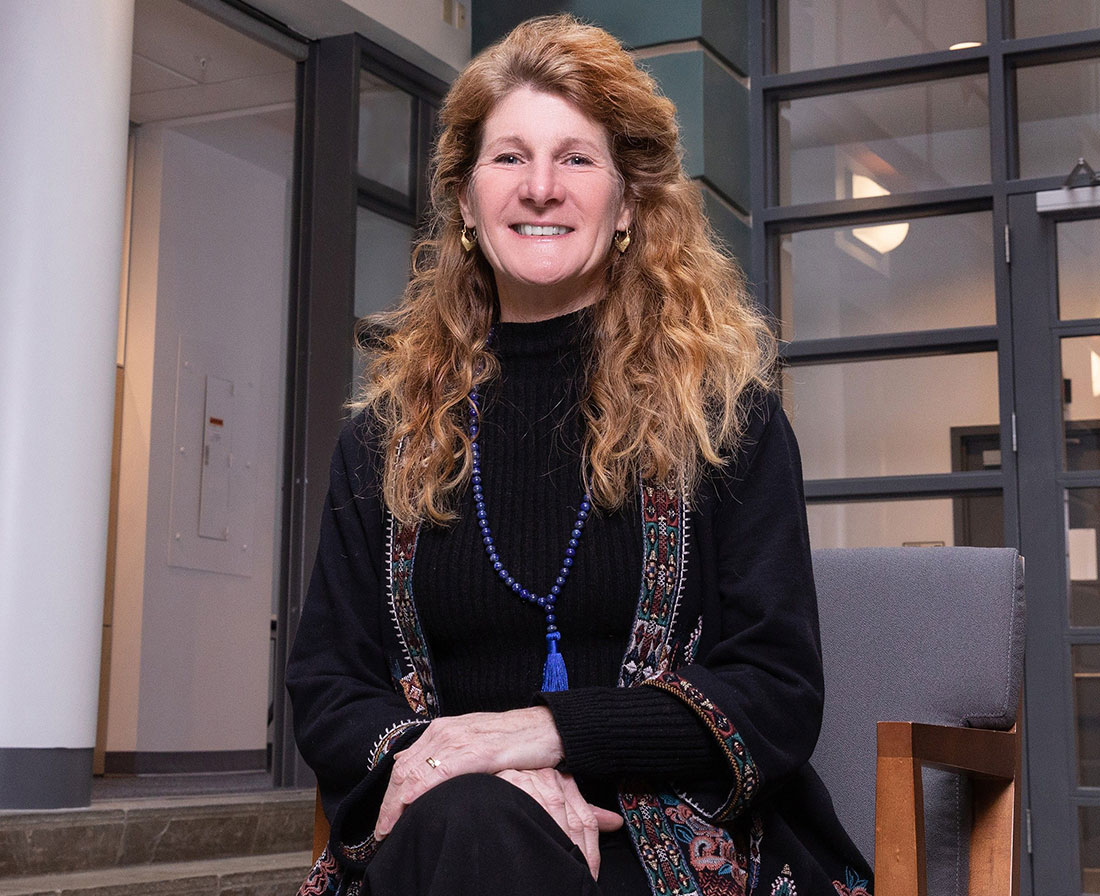
“Dessa’s credentials and passion for this opportunity were simply outstanding, and we are fortunate to have her represent us with the Honors program,” says Falk Associate Dean of Faculty Affairs Mary Graham, who was joined on the committee by Associate Dean of Academic Affairs Kay Bruening, Associate Dean of Research and Administration Katie McDonald, and Nutrition and Food Studies Associate Teaching Professor Chaya Charles.
“The Honors core faculty are so pleased to welcome Dr. Bergen-Cico to the group,” says Honors Program Director Smith, Professor of African American Studies in the College of Arts and Sciences at Syracuse. “The core faculty are high-impact teachers and researchers, at the forefront of their disciplines. They enhance the collegial experiences of students and are integral to the program.
“Dr. Bergen-Cico brings a background of undergraduate education excellence and academic leadership,” Smith adds. “We are excited to work with her to impact students, the campus, and our communities as a whole.”
Bergen-Cico holds a research appointment at the Syracuse Veterans Administration Medical Center and is a Fellow of the American Academy of Health Care Providers in the Addictive Disorders. She is a Certified Addiction Specialist (CAS), Certified Health Education Specialist (CHES), and Certified Mindfulness-Based Stress Reduction (MBSR) Teacher.
Bergen-Cico completed her MBSR teacher training through the Center for Mindfulness in Medicine, Health Care, and Society at the University of Massachusetts Medical School. She has been selected for two Fulbright Scholarships and was selected as a Rotary Peace Fellow in the International Rotary Peace Program at Chulalongkorn University in Thailand.
Bergen-Cico is currently leading a research team that’s exploring how to combine an artificial intelligence system with mindfulness-based practices to help people in treatment for opioid use disorder, and she co-developed the International Drug Policy Academy, which is one of several unique opportunities for students to obtain global experience that exposes them to new ways of thinking about substance abuse and addictive behaviors.
“As an Honors Faculty member, I would be able to teach students interdisciplinary and global perspective courses that encompass depth and breadth of content I am otherwise not afforded the opportunity to teach, at the level our top students need and want,” Bergen-Cico said in her letter of interest for the Honors Core position. “For example, it would afford opportunities to engage students in learning and research in applied neuroscience and cross-cultural biomarkers across diverse fields of study integrating sociology, psychology, and neurobiology in the study of addictive behaviors, stress, trauma, and conflict.”
Bergen-Cico is replacing Rick Burton, David B. Falk Endowed Professor of Sport Management, as Falk College’s Honors Core Faculty member.
“I and my colleagues in the Dean’s Office would like to thank Professor Burton for serving so capably for over 10 years as our Falk College designee to the Honors Program,” Graham says.
Class of 2024 Honored with Sport Management and Sport Analytics Awards
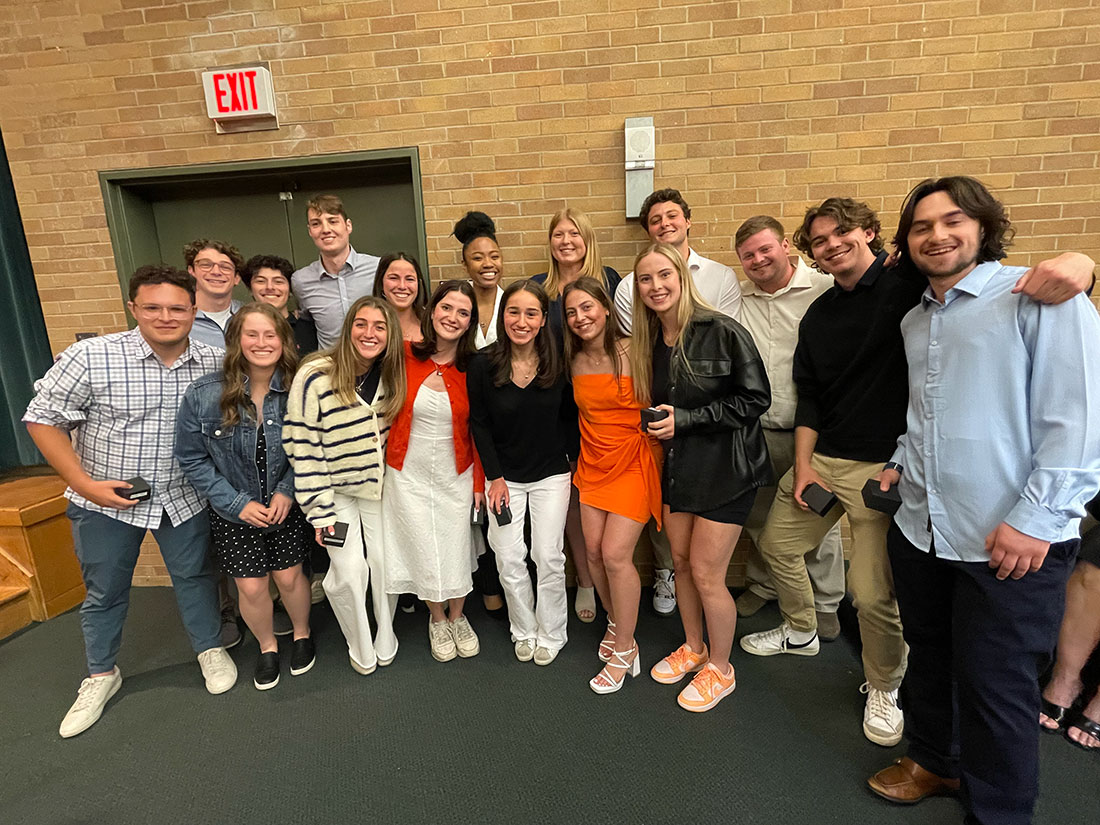
The Department of Sport Management held an awards celebration May 10 in Falk College. Students who were recognized for academic excellence, philanthropic work, and post-graduate plans included:
Falk Scholars
Falk College Scholars represent undergraduate students in Falk College who display academic excellence, exceptional campus and community engagement, and personal integrity. This years department of sport management Falk College Scholars are:
Sean Boland
Tyler Bolebruch
Alison Gilmore
Nicholas Kamimoto
Alexander Oppel
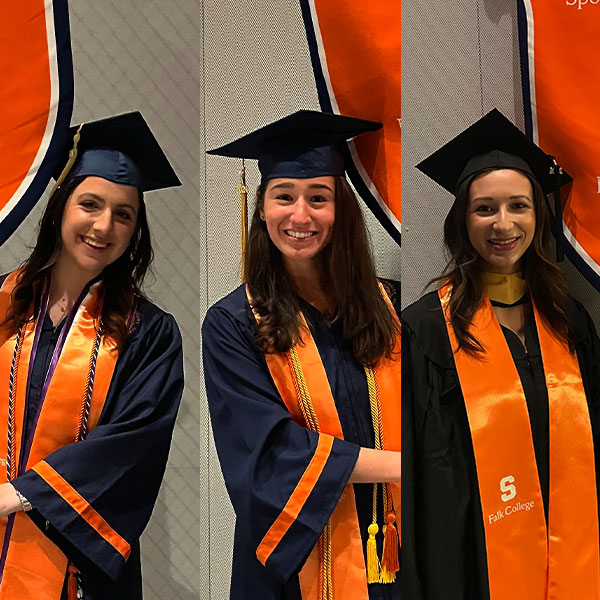
Falk Marshals
Senior Class Marshals have excelled during their time on campus and exemplify the spirit of the senior class. The selection committee assesses the nominees on scholarship, academic honors, student organization involvement, and campus/community service.
Falk Marshal: Alison Gilmore
Sport Management Marshal: Sydney Topper
Sport Analytics Marshal: Marissa Schneider
Sport Venue and Event Management graduate student Marshal: Erica Trobia
Berline Sport Analytics Scholars:
Thomas Armstrong
Tyler Bolebruch
Sean Boland
Nicholas Catalano
Alison Gilmore
David Gold
Brett Gustin
Nicholas Kamimoto
Alexander Oppel
Quinn Robnett
Marissa Schneider
Director’s Academic Achievement Award
Sport Management
Twenty-five Sport Management students received the Director’s Academic Achievement Award for achieving a GPA of 3.4 or higher for each of their consecutive semesters at Syracuse University:
Josephine Belcher
Nina Bilotti
Tracey Edson
Elizabeth Ellis
Jordan Fritz
Huzhe Gao
Carly Goldblatt
Alexander Grossman
Ethan Harrison
Ethan Hetu
Xinyue Huang
Madeline Huzjak
Jacob Kasdan
Quinn Kreller
Carter Lewis
Margo Noble
Sydney Orszulak
Jacob Palczak
Kyla Pearlman
Elena Randolph
Allison Rosen
Zachary Roth
Philip Tepper
Sarah Thompson
Sydney Topper
Sport Analytics
Fourteen students Sport Analytics students received the Director’s Academic Achievement Award for achieving a GPA of 3.4 or higher for each of their consecutive semesters at Syracuse University:
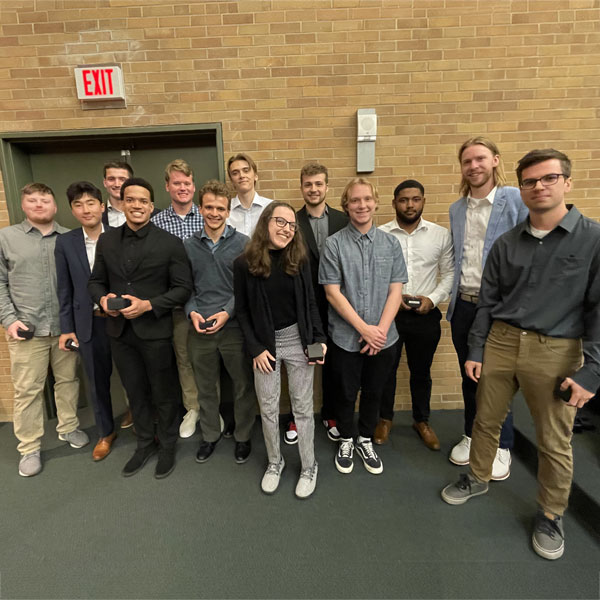
Jackson Bayuk
Sean Boland
Tyler Bolebruch
Martin Castner
George will Cave III
Lucas Falcetti
Alison Gilmore
Jacob Graff
Mathew Holes
Jordan Jones
Niccholas Kamimoto
Ryan O’Connell
Alexander Oppel
Quinn Robnett
Sport Management Director’s Award
This award is presented to a student with a GPA of 3.5 or higher and a person who is a strong ambassador for the department, demonstrates exemplary service to the community, possesses strong professional sport industry experience, and is a strong mentor for other Sport Management majors.
Recipient: Elena Randolph
Elena has embraced the entire mantra of our program. She is graduating with a 3.9 GPA and has been an instrumental member of the graduating class in both the classroom and her engagement within the field and program. She served as President of the Sport Professionals of Color Club for two years. In 2022, Elena was selected to attend the Michigan Sports Business Conference, where she was named a BIG Initiative Award Winner as one of the 11 highest-achieving sport management students in the United States and Canada. Elena has interned with Syracuse University Athletics, the WNBA and BSE Global. Most recently, Elena completed her senior Capstone internship with the WNBA Players Association. We are proud to say that Elena has been asked to extend her internship until the end of the season with the WNBA Players Association.
Sport Management Director’s Award for Academic Promise
This award is presented to a student who will attend graduate or professional school; has attained a GPA of 3.5 or higher; and is a person who is a strong ambassador for the department, demonstrates exemplary service to the community, possesses strong professional sport industry experience, and is a strong mentor for other Sport Management majors.
Recipient: Nina Bilotti
Nina will graduate summa cum laude in Sport Management, where she amassed a distinguished academic career earning a GPA of 3.9. She is a member of the Pre-Law Society, Sport Law Club, Sport Management Club, and Women in Sports and Events. Nina was an operations assistant with the Syracuse Crunch Hockey Club, as well as a front office intern. She was a social media intern with Syracuse Athletic Communications working with women’s soccer, football, women’s rowing, and softball. In her hometown of Denville, New Jersey, she was a youth lacrosse coach and played for the Syracuse Women’s Lacrosse Club. She completed her senior Capstone with Priority Sports and will continue her post-graduate education this fall in advertising and public relations in Syracuse University’s Newhouse School of Public Communications.
Sport Management Academic Excellence Award
The Sport Management Academic Excellence Award recognizes a student with a grade-point average of 3.8 or higher.
Recipient: Madeline Huzjak
Madeline graduated with a GPA of a 3.97. What is more impressive is that along with her academic accomplishments, she has also been heavily involved in a variety of activities. Maddie was a member of the club soccer team all four years. She also interned with Syracuse University athletics in athletic communications, Cuse Crew, and the Stevenson Center. Maddie was a member of the Women and Sport and Events club, and served as president in 2021. Outside of Syracuse, she also completed internships with the University of Pittsburgh, Actual Size, and the Pittsburgh Steelers. Most recently, Maddie completed her Senior Capstone with the Philadelphia Eagles, first as a ticket and fans service intern and was then moved into a community relations seasonal associate role. After graduation, Maddie will be heading to the National Football League to be part of their rotational program. Maddie is the first student in the history of the program to get accepted into the rotational program at the NFL.
Matt Brodsky Philanthropic Excellence Award
This award is named after Matt Brodsky, a sport management major who passed away unexpectedly after the Fall semester of his freshman year in 2013. In his honor, the department created an award that stems from his philanthropic excellence while he was a student at Syracuse University. This award is presented to a student who displays outstanding service to both the campus and greater Syracuse communities; demonstrates exemplary citizenship and philanthropic qualities; serves as a mentor for students by establishing outreach opportunities for the Department and University; and is an exemplary representative of Sport Management.
Recipient: Sarah Thompson
Sarah has been involved in the sport management program and the community for the past four years. Sarah was a four-year member of the women’s ice hockey team. As part of her passion for hockey, Sarah created her own non-profit organization called Sticks Together, giving children around the world the opportunity to learn and play the sport of hockey. She manages her program through the IVHQ Sport Development program with the goal of providing innovative physical education lessons and introduce the game of hockey. She partnered with CARHA Hockey as it further expands into community driven work and with Play it Again Sports to collect recycled hockey sticks and other street hockey equipment to donate to schools and communities. She has led hockey mission trips to Argentina in the summer of 2022 and South Africa last summer. She is continuing her efforts as she is planning a trip to Tigman Village, Palawan, this summer. Sarah recently completed her Senior Capstone with Game Changer. Sarah will attend graduate school at St. Lawrence University, where she will work toward a Master of Arts in Leadership degree and continue to play hockey.
Sport Management Professional Engagement Award
This award is presented in recognition of a student’s real-world experience, work ethic, dedication, professional demeanor, and career development as an undergraduate student and representative of the Department of Sport Management. This student’s outstanding academic achievements, coupled with strong citizenship and community service, typify the hard work, dedication, and preparation the student made throughout their academic career at Syracuse University.
Recipient: Tracey Edson
Tracey has been involved with Syracuse University since she was very young and came into the program with a drive and passion that led her to incredible success. She has skillfully managed her time each day and had a 3.9 GPA while being involved in everything Syracuse University has to offer. For Falk College, Tracey has been a student ambassador, peer advisor, and summer teaching assistant. For the department, she has served as a member of the Women in Sports and Events (WISE) and Sport Management clubs. For the Sport Management Club, she served as the communication committee chair for two years.
Outside of the college and department, Tracey found a second home in athletics. She started out in athletic communications and then found a passion for ice hockey and served in a variety of roles for the team, including digital media and most recently as the Director of Operations as her senior Capstone. Outside of campus, Tracey has gained tremendous experience through other organizations, including The Basketball Tournament and the Syracuse Crunch. Besides her engagement within sport management, Tracey was also heavily involved with organizations such as the Fellowship for Christian Athletes. She has been an incredible member of our program and always comes in with a smile on her face and a willingness to help with whatever is needed. Upon graduation, she will head to the University of North Carolina Chapel Hill to pursue a master’s degree in sport administration.
Jason Morales Perseverance in Sports and Life Award
This award is named in honor of Jason Morales, a sport management student who passed away while completing his Senior Capstone in New York City in 2013. Since 2014, this award has been given in Jason’s honor to a student who has demonstrated persistence, perseverance, and positive motivation throughout his/her academic career while striving to be their best when confronted with life’s challenges. Jason overcame many challenges while at Syracuse University and was just 6 weeks away from graduation when he passed away.
Recipient: Andrew Amell
Andrew has exemplified the meaning of this award by overcoming several points of adversity throughout his college career. Andrew has shown immense motivation, passion, and the ability to overcome the most difficult challenges. Andrew has a passion and love for Syracuse that stands out among his peers. Despite life’s challenges, Andrew always gives 110 percent of his abilities, keeps a smile on his face, and works hard to overcome whatever is in his way. Most recently, Andrew completed his senior capstone with the Syracuse University Men’s Basketball Operations Department after serving as a team manager for the past three seasons.
Sport Management VIP Award
The Sport Management VIP Award is presented to a student with outstanding service to the department; has engaged in a variety of experiential learning and sport industry experiences; actively volunteers to serve the department and University on a regular basis; demonstrates strong professionalism and outstanding character; and serves as a role model for Sport Management majors.
Recipient: Philip Tepper
Philip has been an integral part of this department since he stepped foot on campus as a freshman. He has carried a 3.9 GPA while also engaging himself in the experiential learning opportunities within the University. Philip has been an active member of the Sport Management Club for all four years, serving as a committee member for the donations and inventory committees. He also served as Vice President of the Programming Committee. Philip has completed internships with the Sports Broadcast Journal and Three Two Strategies. Most recently, in the fall, he completed his Senior Capstone with the Bowl Season. He did such an outstanding job that they kept him on this past spring as a digital media assistant.
Kate Veley Civic Engagement and Social Responsibility Award
Kate worked at Syracuse University for more than 15 years and was instrumental in the planning of the annual Sports Charity Auction. She recently retired as the Director of Corporate Philanthropy for Make A Wish of Central New York. The Kate Veley Civic Engagement and Social Responsibility Award is presented to a student who has “given back to the community they’ve called home for the past four years.” This student has continually demonstrated strong volunteerism and philanthropic effort to improve the lives of others within the greater Syracuse community, and in so doing, set an example for us all.
Recipient: Alexander Grossman
Alex served as 2023 co-chair for the Sport Management Club’s Annual Charity Sports Auction that raised $48,000 for Tillie’s Touch in Syracuse. During his four years as a club member, Alex held leadership roles as the Co-Chair for Sales and Vice President of Community Service. This semester, Alex completed his Senior Capstone with WSC Sports. Alex also interned for Perfect Game Collegiate Baseball League, Amsterdam Mohawks, and Vandetta Sports Media. These experiences prove Alex’s dedication to giving back to the community, the department is confident Alex will continue on this path.
Patrick Ryan Sport Technology Award
This award is named after Professor Emeritus Patrick Ryan, who taught at Syracuse University for 15 years before retiring in May 2021. He taught and created all the Sport Technology courses for the department. Prior to joining Syracuse, Ryan worked in the technology industry for more than 30 years. This award recognizes a student’s entrepreneurial spirit and academic excellence while utilizing technology to enhance personal skills.
Recipient: Allison Rosen
Allison completed her senior Capstone last summer and fall with the Premier Lacrosse League as a Social Media Intern and, for the last three years, served the Syracuse Athletic Department as a Creative Services Intern and Women’s Soccer Student Manager. Her creative photography work has been featured on many local media sites, especially her work with Syracuse men’s lacrosse. Additionally, she served as a Donations Chair for the Sport Management Club Charity Auction and Communications Officer for Sport Excel UK, a sports association aiding those with learning disabilities. She has used her communications and photography skills and served in leadership roles with Women in Sports and Events (WISE), Sport Management Club, and the Daily Orange.
Sport Venue and Event Management Graduate Student Award
Recipient: Holly Carr
Holly graduated from SUNY Oswego with a degree in business administration and management. While at Oswego, Holly was a member of the field hockey team and found an interest in working in sport during her experiences with the SUNY Oswego Athletic Department and the SUNY Athletic Conference. Since joining our program last July, Holly has embraced our philosophy of experiential learning by working in the JMA Wireless Dome; as a graduate assistant in the Department of Sport Management assisting faculty with teaching and research; and as a volunteer with organizations such as the Savannah Bananas during their tour stop in Cooperstown. She also played a pivotal role in the planning of the SVEM graduate student immersion trip to New York City. Holly’s outstanding academic achievements, along with her strong leadership and respect that she earned from faculty members and her peers, make her a role model for future graduate students.
Sport Analytics Academic Excellence Award
This award is in recognition of a student’s outstanding academic achievement and overall scholarship in Sport Analytics.
Recipient: Sean Boland
Sean is a Berlin Scholar and Falk College Scholar. He has been incredibly engaged on campus during his time in Syracuse. Sean has served as a student manager/data analyst for the SU men’s soccer team since the fall of 2021, including being part of the national championship-winning team in 2022. Sean has also served as a data analyst for the Swiss professional soccer team FC Wil (VILL), data collection analyst for Pro Football Focus FC, and data analytics intern for the Hamptons Collegiate Baseball League. He also served the department as a teaching assistant in the 2023 Berlin Sport Analytics Academy for high school students.
Sport Analytics Academic Excellence Award
This award is in recognition of a student’s outstanding academic achievement and overall scholarship in Sport Analytics.
Recipient: Nicholas Kamimoto
Nicholas is a Berlin Scholar and Falk College Scholar. This spring he was part of the team that captured the team title at the 2024 National Collegiate Sports Analytics Championship. He has been an active member of the football and basketball analytics clubs on campus and has served as a supervisor in the Barnes Center. Nick has spent time as a video and analytics intern with San Francisco Glens SC, as well as a Technology and Data Services intern with the United Soccer League. In addition, Nick contributed significantly to a research project with Dr. Sanders and Dr. Ehrlich that was selected as a finalist at the prestigious MIT Sloan Sports Analytics Conference.
Sport Analytics Director’s Award for Academic Promise
This award is in recognition of a student’s plans to attend post-graduate education, exemplary service to the community, and service as an ambassador and mentor to students in Sport Analytics.
Recipient: Tyler Bolebruch
Tyler is a Berlin Scholar and Falk College Scholar. He has been active gaining experience in the industry, having completed internships with the Amsterdam Mohawks and EV Analytics. This spring, he was part of the team that captured the team title at the 2024 National Collegiate Sports Analytics Championship. Tyler has been accepted to continue his educational experience in the Applied Data Science Master’s Program in the School of Information Studies at Syracuse University.
Sport Analytics Research Excellence Award
This award is in recognition of a student’s demonstrated commitment and success in academic research, presentation, and publication in Sport Analytics.
Recipient: Quinn Robnett
Quinn is a Berlin Scholar and has spent significant time focused on research. He is a key member of hockey analytics club, serving as director of media, and has also spent time as an analytics intern with Syracuse University’s field hockey team. He has also been selected twice to participate in the MIT Sloan Sports Analytics Conference Hackathon, making it to the finals in his first year. Last summer, Quinn was chosen as a participant in the highly competitive Undergraduate Summer Research program at Carnegie Mellon University. Throughout that experience he worked on a project, Examining the Decline of Save Percentage in the NHL, that he presented at the Carnegie Mellon Sports Analytics Conference in November 2023. Quinn will continue his education at Syracuse University as he completes a master’s degree in applied data science through the School of Information Studies in the coming academic year.
Sport Analytics VIP Award
This award is in recognition of a student’s outstanding service, volunteerism, strong academic standing, leadership, and service as a role model to students in Sport Analytics.
Recipient: Alexander Oppel
Alex has been an omnipresent member of the department. As a Berlin Scholar, Alex has been a major part of research analyzing the impact of television proliferation on live college basketball attendance. He has a long list of accomplishments: He is one of the few students to present research at the 2023 SABR Analytics Conference, he was a major contributor of Syracuse’s first overall winning team at the SABR Diamond Dollars competition, and he was a member of the winning team for the Cincinnati Reds’ Hack-a-Thon. He has completed internships with Wasserman and Syracuse softball, and he is a Falk Scholar. He also served as president of the Sabermetrics Club and has been a constant mentor to our baseball-focused students.
Sport Analytics Game Changer Award
This award is in recognition of a student’s positive impact on fellow Sport Analytics students and their unyielding dedication, professional skills, and commitment to succeed. This student has “changed the game” and made a tremendous difference in our program and across campus at Syracuse University.
Recipient: Alison Gilmore
Alison is Berlin Scholar and Falk College Scholar. She also received two of the University’s highest honors, being named a Syracuse University Scholar for the Class of 2024 and a 2023-24 Remembrance Scholar. Alison has been active in student competitions throughout her time in the program, including winning a room in the inaugural Football Analytics Blitz competition in 2021 and being part of, and leading, a team at SABR Diamond Dollars Case Competitions in Arizona. She is an active member of Falk College’s Sport Analytics Women’s Club, having served as president.
Alison earned internships with Zoomph as a Women in Sports Tech Fellow, Sports Reference, and most recently, 6-4-3 Charts. In addition, she is a Falk College Ambassador and Peer Advisor, and a student assistant with the Disability Cultural Center. She is a key member of OttoTHON and Orange Seeds. Alison has truly made a difference in the program, and the department wishes her the best of luck as she starts her professional career with the Detroit Tigers as a Baseball Analytics Associate.
Page 1 of 32
